#the search for identity for liberation
Text

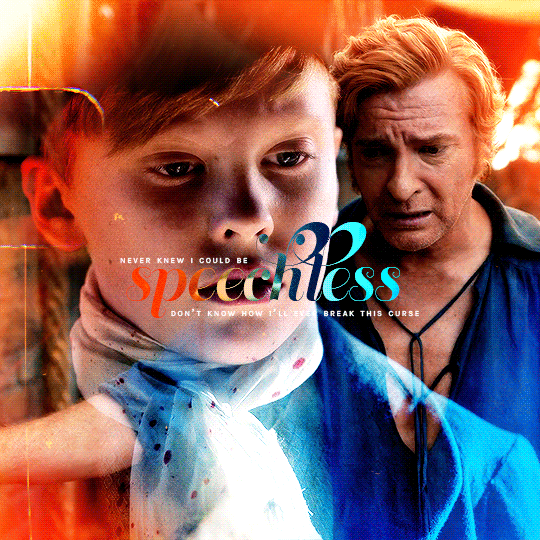
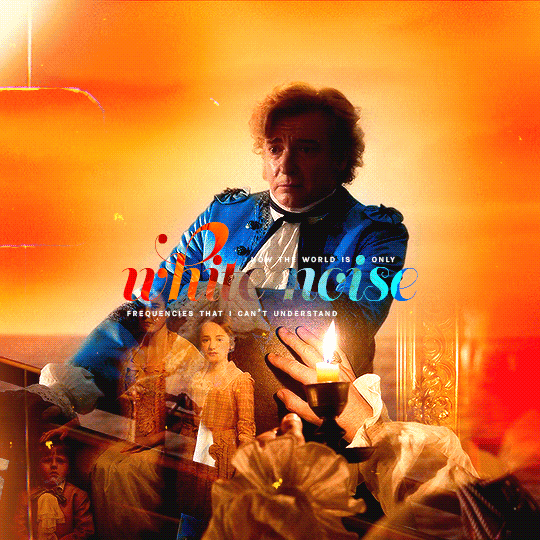

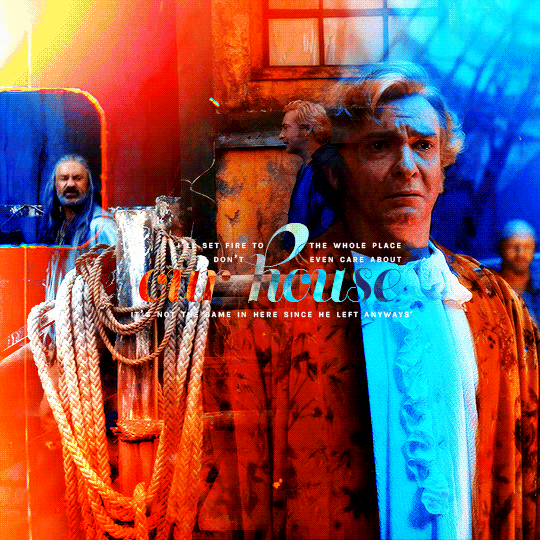



STEDE BONNET / BURN IT DOWN by Daughter
#ofmdedit#ourflagmeansdeathedit#ofmd#our flag means death#stede bonnet#userbecca#useravia#usernobie#userelio#ughmerlin#edits#this is his song and i stand by it#the emotional abuse the repression the fear and the inadequacy#all the 'you have to be like this to be a man' the 'there's something wrong with you'#the search for identity for liberation#the many many shortcomings and the rise and the falls#the gains and the losses#the reality of things crashing against the ideal and the dream#stede bonnet the character that you are#ofmd spoilers
476 notes
·
View notes
Text
Something that’s crazy about me becoming a TERF is that I was actually trying to become a better trans rights activist.
My family are transphobic and I was not. Some of their questions I couldn’t answer. In particular, the famous “What is a woman?” I searched twitter posts and tiktoks and every TRA definition just sounded misogynistic as fuck. Until I kept scrolling and found posts by TERFs that just clicked something in my brain.
I had also always had views of a gender abolitionist. Combining this with my TRA past I even considered if that meant I was non-binary, because I didn’t match with this socialised version of ‘woman’. But I never felt comfortable with a non-binary identity because I am perceived as a woman, I suffer from being a woman, AND SOCIALISED STEREOTYPES ARE NOT WHAT MAKES A WOMAN.
I couldn’t continue debating and defending trans people and gender ideology anymore as all I could hear was myself as a misogynist. I knew the world would be a better place with gender abolition rather than gender liberation. I came to the realisation that gender ideology enforces the socialised gender binary that was designed to oppress women.
#radblr#radical feminism#radical feminist safe#radical feminists do interact#gender critical#radical feminist community#terfsafe#gender abolition#terfblr
921 notes
·
View notes
Text
I was never really certain about my transition in the way that most gatekeeping hormone prescribers and curious members of the public demand that a trans person be. I didn’t “always know” that I was not cisgender. I haven’t “always known” anything about myself. Very few truths about me have always remained true, my existence is too interpersonal, contextual, and ever-evolving for all of that. (So is most everyone else’s, I think). I don’t think that the fact I’d eventually choose to exercise my body autonomy at age 30 by taking hormones is a decision I could have foreseen when I was a child.
All that I knew about being transgender when I was a kid was a fact that most children intuitively know: gender assignment was a violation of my freedom, of everyone’s freedom in fact, and it was wrong. As an infant and then a child and teenager, people kept imposing labels on me; they kept forcing me and my body into prescribed gendered boxes, and while the specific labels and boxes never really felt like the right ones, the most disturbing part about it all was the forcing. No coerced identity would have ever felt right.
Children can tell when secrets are being kept from them, and when adults are restricting their choices. They notice that they and the other children are being lined up boy-girl, boy-girl, without ever being told what a girl or a boy even is. They can see their parents frowning when they reach for the doll with the shimmery hair, or climb atop the neighbor kid on the playground. Kids know that they are forbidden from sitting with their legs spread wide or flicking their wrist, and their gender illegibility is shamed in them, long before they get any answers about what gender means or where it comes from or why it’s so important that they make themselves easy to understand.
Like the cloned children in Never Let Me Go who grow up being conditioned for a life of forced organ donation, children in a cissexist society grow up conditioned to fall within certain gendered boundary lines, and by the time they learn that the reason for this is almost completely arbitrary, they can’t imagine any alternative. Not until some of them hear about gender transition and find the prospect very compelling, for some reason.
You can say that reason is because some of us are inherently trans, but there’s absolutely nothing in the way of brain science, genetics research, or even sociological data to back that up. Besides, the search for a biological “reason” that people are transgender or queer runs counter to the goal of queer liberation in the long run. Science only needs to explain the existence of transgender people (or queer people more broadly) if our existence is in some way aberrant or a problem.
If queerness is accepted as a form of human diversity that simply exists, then there is no need to excuse it by claiming that it is never a choice. It can be a choice, if a person wants to make it, and hopefully it satisfies them, but maybe it won’t. Freedom to choose means freedom to forever be dissatisfied, to search endlessly for more, and yes, to capable of making a mistake.
I would say that viewing myself as transgender was a choice. I decided to break away from the straight, female categories to which I had been assigned, and doing so allowed me to view the legal and societal power structures that had restricted me more clearly. It helped me better understand myself. But that does not mean the actual act of breaking away was always the truest reflection of who I am.
The version of me that transitioned was a person on the run — and how a person behaves, thinks, and self-conceives when they are fleeing is not a great reflection of whom they might be if they were safe. If we all lived in a world free from mandatory gender assignment, and where our bodies were not mined for meaning about the kinds of sex we liked, the clothing we should wear, the personality qualities we have, the roles we should play in society, and the connections we are allowed to form with others, who knows who each of us might be.
But none of us get to live in that world, or ever gets completely free from the frameworks of heterosexuality and the gender binary. These frameworks shape every legal institution we encounter, every school we attend, every item of clothing we put on, every substance we take into our bodies, every piece of paperwork that ever gets printed about us, and every look another person ever gives us. And so we make due with rewriting and recombining those frameworks as best we can.
It should come as no surprise that those us who break away from the binary have to experiment and revise how we understand ourselves quite a bit — sometimes getting things “wrong,” sometimes searching forever for the semblance of something “right.” Sometimes reveling in the “wrongness” of all the available options is kind of the point.
I wrote about my detransition, retransition, and the eternal dissatisfaction that is probably the corest truth of my identity. It's free to read or have narrated to you on my Substack.
297 notes
·
View notes
Text
black & palestinian solidarities
if you support black liberation but are unsure of your stance on palestinian resistance, here’s a reminder that they are deeply intertwined. after the 1917 balfour declaration by the british government announcing the first support for a zionist state in palestine, zionism and israeli occupation of palestine have followed similar ideologies and practices to white supremacist settler colonial projects, so solidarity between black and palestinian communities has grown over time, seeing each other as fellow anti-imperialist and anti-racist struggles. (if you get a paywall for any of the sources below, try searching them in google scholar.)
palestinians have been inspired by and shown support for black liberationist struggles as early as the 1930s, when arabic-language newspapers in palestine wrote about the struggle by black folks in the united states and framed it as anti-colonial, as well as opposing the 1935 invasion by fascist italy of ethiopia, the only independent black african state at the time. palestinian support for black struggles grew in the 1960s with the emergence of newly-independent african states, the development of black and third world internationalisms, and the civil rights movement in the united states. palestinian writers have expressed this solidarity too: palestinian activist samih al-qasim showed his admiration for congolese independence leader patrice lumumba in a poem about him, while palestinian poet mahmoud darwish’s “letters to a negro” essays spoke directly to black folks in the united states about shared struggles.
afro-palestinians have a rich history of freedom fighting against israeli apartheid, where they face oppression at the intersections of their black and palestinian identities. some families trace their roots back hundreds of years, while others came to jerusalem in the nineteenth century from chad, sudan, nigeria, and senegal after performing the hajj (the islamic pilgrimage to mecca) and settled down. still others came to palestine in the 1940s specifically to join the arab liberation army, where they fought against israel’s ethnic cleansing of palestinians during the 1948 nakba (“catastrophe”). afro-palestinian freedom fighter fatima bernawi, who was of nigerian, palestinian, and jordanian descent, became, in 1967, the first palestinian woman to be organize an operation against israel, and subsequently the first palestinian woman to be imprisoned by israel. the history of afro-palestinian resistance continues today: even as the small afro-palestinian community in jerusalem is highly-surveilled, over-policed, disproportionately incarcerated, and subjected to racist violence, they continue to organize and fight for palestinian liberation.
black revolutionaries and leaders in the united states have supported the palestinian struggle for decades, with a ramp-up since the 1960s. malcolm x became a huge opponent of zionism after traveling to southwest asia and north africa (SWANA), publishing “zionist logic” in 1964, and becoming one of the first black leaders from the united states to meet with the newly formed palestine liberation organization. the black panther party and the third world women’s alliance, a revolutionary socialist organization for women of color, also supported palestinian resistance in the 1970s. writers like maya angelou, june jordan, and james baldwin have long spoken out for palestinians. dr. angela davis (who received support from palestinian political prisoners when she was incarcerated) has made black and palestinian solidarity a key piece of her work. and many, many more black leaders and revolutionaries in the united states have supported palestinian freedom.
while israel has long courted relationships with the african union and its members, there has been ongoing tension between them since at least the 1970s, when all but four african states (malawi, lesotho, swaziland, and mauritius) cut off diplomatic ties with israel after the 1973 october war. while many of those diplomatic relationships were reestablished in subsequent decades, they remain rocky, and earlier this year, the african union booted an israeli diplomat from their annual summit in addis ababa, ethiopia, and issued a draft declaration on the situation in palestine and the middle east that expressed “full support for the palestinian people in their legitimate struggle against the israeli occupation”, naming israeli settlements as illegal and calling for boycotts and sanctions with israel. grassroots organizations like africa 4 palestine have also been key in the BDS (boycott, divestment, sanctions) movement.
in south africa, comparisons between israel and south african apartheid have been prevalent since the 1990s and early 2000s. israel historically allied with apartheid-era south africa, while palestinians opposed south african apartheid, leading nelson mandela to support the palestinian liberation organization as "fighting for the right of self-determination"; over the years his statements have been joined by fellow black african freedom fighters like nozizwe madlala-routledge and desmond tutu. post-apartheid south africa has continued to be a strong ally to palestine, calling for israel to be declared “apartheid state”.
black and palestinian solidarities have continued into the 21st century. palestinian people raised money to send to survivors of hurricane katrina in the united states in 2005 (which disproportionately harmed black communities in new orleans and the gulf of mexico) and the devastating earthquake in haiti in 2010. in the past decade, the global black lives matter struggle has brought new emphasis to shared struggles. prison and police abolitionists have long noted the deadly exchange which brings together police, ICE, border patrol, and FBI agents from the united states to train with soldiers, police, and border agents from israel. palestinian freedom fighters supported the 2014 uprising in ferguson in the united states, and shared strategies for resisting state violence. over a thousand black leaders signed onto the 2015 black solidarity statement with palestine. the murder of george floyd by american cops in 2020 has sparked further allyship, including black lives matter protests in palestine, with organizations like the dream defenders making connections between palestinian and black activists.
this is just a short summary that i came up because i've been researching black and asian solidarities recently so i had some sources on hand; there's obviously so much more that i haven't covered, so please feel free to reblog with further additions to this history!
#free palestine#black liberation#black and palestinian solidarity#black and asian solidarity#original
633 notes
·
View notes
Text
Rahu & Ketu: The Mystery of Being
TW: abuse, rape, murder, abduction, childhood trauma, violence
The more I study Nodal energy, the more I realise how truly hard it is to remain within its influence, it escapes your grip or eludes you so easily and I think even Nodal natives feel this way, its really hard to have a stable/consistent self image or strong identity because with Rahu you are sooo many different things and your energy is dispersed completely (Rahu being the "head") and with Ketu, you're in the dark completely so you feel unable to identify with anything permanently i.e you outgrow things quickly (Ketu being the "body"). Both Rahu & Ketu are malefics and generally considered to be inauspicious but please don't be discouraged!!
The reason why they're considered inauspicious is because Rahu creates excessive immersion in the material realm as these natives are always looking out of themselves/seeking external things to centre themselves around. Since they're stuck in the head (literally) they're unable to be grounded or tethered. This causes overindulgence and gluttony. They might seem greedy on the outside but truly this is driven by their boundary-less nature where they literally do not know when to stop, nothing feels "enough" for them, they never feel "full". Since they're so vastly spacious internally, they can accommodate a lot, this makes them very tolerant and accepting of virtually every one and every kind of experience. But this internal spaciousness also means that they feel empty, just because its hard to "fill up" all that space and feel "fulfilled". This causes them to overexert themselves and go above & beyond. They do this just because they can. This is why they're such obsessive lovers. They have so much space, so much to hold, they need a great deal of stimulation just to feel normal. In social settings they may come across as very hyper, very loud, very extra, always doing the most, eager to please everyone (its similar but different to Jupiter energy). This over-attachment to the physical or sensorial realm means that its hard for them to transcend beyond it to attain true spiritual liberation. They can never fully let go because its very scary to be cut off that way. Its like floating in space, nothing to hold on to, no gravity, nothing to fall on, you can't stay still, its all very disorienting.
The reason Ketu is considered inauspicious is because it causes extreme detachment from everything. These natives don't have a strong sense of self, they feel themselves dissolve almost and they're always wandering in search of something to connect to. This complete lack of attachment to anything material or concrete means that these natives lack grounding. In order to care about something you have to be firmly rooted in reality and Ketuvians struggle with this because they're never fully here. They may intellectually understand or support social causes but its a torso without a head, which means they dont have the energy to be committed to sustaining interest in anything. They're the type of people who go through a lot of different "phases". One can only transcend if one is connected to life in the first place, these natives aren't. It DOES make spiritual understanding easier and Ketu is considered one of the most spiritual planets but it is difficult to be rooted or grounded in this or be disciplined about it because like I said Ketu is detached. They inherently understand certain spiritual truths but its very rare (unless other positive placements are present) for these natives to fully immerse themselves in spiritual pursuits.

(table by me😎hehe)
Its very interesting to me that none of the Nodal naks have the purushartha ("motivation") of Moksha (liberation). All 6 naks are evenly split between Artha, Kama & Dharma.
This again points to how even though Nodal influence helps one grasp spiritual concepts better and naturally embody certain spiritual truths, these natives are not motivated by it.
But often what happens is that these natives are unable to enjoy or benefit from their successes. Their lives are full of ups and downs. The shadowy nature of the planets and the fact that the lack of physical existence of these planets creates a very "boundary less" energy that makes them susceptible to every kind of influence, good and bad.
Pierce Brosnan- Ardra Moon
Pierce Brosnan’s hardships pretty much started at the very beginning. Born into a poor family in rural Ireland, he was swiftly abandoned by his father, who he would only go on to meet once. His mother was forced to send him to live with his grandparents while she worked as a nurse in England, then his aunt and uncle, and then onto a boarding house. His mother visited twice a year until he could move to England at age 11, at which point he became the focus of school bullies.
In 1980, Brosnan married Cassandra Harris and adopted the 3 children of her late-husband, adding one more to the mix for good measure. But in 1991, Cassandra died in his arms after a 4 year battle with ovarian cancer, which would later go on to take the life of their 41 year old daughter Charlotte in 2013. By then, he had become estranged from his son Chris, who had a major drug problem resulting in fights, thefts, and 2 drunk-driving crashes in 2 years. The crashes may have been the straw that broke the camel’s back, as Brosnan had already narrowly avoided losing his son Sean at 13, after Sean’s cousin drunkenly drove off a 200-foot cliff. In 2015, the $18-million Malibu home he lived in caught fire and sustained $1 million in damages.
Kelsey Grammar, Shatabhisha Sun, Mars in Ashwini, Ketu in Ardra
Kelsey Grammer’s troubles started early in life, with his parents splitting up when he was just two years old. His mother’s parents took them in, and helped raise Kelsey until he was 12, when his grandfather died of cancer. The following year, his father was murdered by a home intruder who had started a fire, all in front of his new family.
Then in 1975, Grammer’s 18 year old sister Karen was abducted, raped, and murdered by four men who left her for dead. Sadly, Karen had enough strength to make it to a nearby house, where bloody handprints revealed she was attempting to ring the door. The house was empty. Kelsey identified his sister’s body one week later. 2 years later, both of his half-brothers died in a scuba diving accident.
Shockingly, Grammer has appeared at the parole hearings of the last remaining member of the gang who killed his sister. In 2014, he spoke directly to the killer at the hearing, stating “You could not have come to a better person in the world than me to advocate for someone who has made some bad choices. I accept your apology. I forgive you. However, I cannot give your release my endorsement. To give that a blessing would be a betrayal of my sister’s life.
Nicki Minaj- Mula Stellium (Mercury, Venus & Ketu)
Throughout her childhood, Minaj had to contend with her abusive, drug-addicted father, who would regularly beat her mother, punch holes in the walls, get arrested, and sell their possessions for drug money. At one point, he attempted to kill her mother by lighting the house on fire. Despite all this, the pair are still together, and Dad apparently isn’t too happy when she tells that story. To this, she says “It’s the price you pay when you abuse drugs and alcohol. Maybe one day your daughter will be famous and talk to every magazine about it, so think about that, dads out there who want to be crazy.” Nicki is currently married to a paedophile and convicted rapist so there's that as well.
Terrence Howard, Mula Moon, Ashwini Venus conjunct Saturn
Terrence Howard suffered physical abuse not only at the hands of his father, but his mother as well. When he was two, he witnessed his father stab a man to death, for which he was convicted of manslaughter. His mother raised him until his father was released, at which point they divorced, and he was sent to live with his grandparents. At age 16, Howard had himself legally emancipated, moved to New York, and lived off welfare while he tried to make it as an actor. While that was undoubtedly one of the hardest decisions he will ever make, it seems it was the right one.
Jennifer Hudson, Shatabhisha Moon
In 2008, Jennifer Hudson's mother, Darnell Donnerson (57) and her brother, Jason (29) were shot to death by her estranged brother-in-law, William Balfour. Hudson's nephew, Julian (7), was reported missing, but found three days later dead of multiple gunshot wounds.
Roy Orbison, Ashwini Sun, Jupiter in Mula & Ketu in Ardra
In 1966, Roy Orbison's wife, Claudette Frady, was killed when the couple were riding motorcycles. She was hit by a semi truck and killed instantly. Just two years later, Orbison's house burned down, killing two of his three sons. In 1973, his older brother, Grady, was killed in an auto accident while traveling to spend thanksgiving with Orbison.
Shania Twain, Magha Sun, Mars in Swati
She was born into poverty with five siblings in rural Canada. Throughout her childhood, she endured and witnessed abuse to her mother from her stepfather, who lived with the family. Aside from the abuse, her family often didn't have money to have food for lunch or shoes for the winter. Even more tragic, her parents were killed in a car accident when she was 22 years old, and Twain began singing gigs to provide for her siblings. She told Oprah Winfrey in a sit-down interview, "Coming from where I came from, it was unimaginable to ever be wealthy. That was just too far out of my reach." She then went on to become one of the best selling female pop and country artists of all time.
Ashley Judd, Ashwini Sun & Mercury, Magha Jupiter & Ascendant
This actress comes from a famous family, with both her mother and half-sister being country music artists. Judd’s parents divorced when she was four, and she moved all around the southern United States while her mother sought success, attending over a dozen schools. Judd is the survivor of three sexual assaults, and one of these awful instances resulted in an unwanted pregnancy, which Judd terminated. The harmful treatment didn’t stop there. Judd alleges that she was also sexually harassed by Harvey Weinstein, whom she later sued.
Christina Aguilera, Mula Sun
Christina’s father Fausto worked for the US Army, meaning that the family moved around a lot, even going as far as Japan. On top of this lack of stability, her father emotionally and physically abused her. Her parents divorced when Aguilera was six, and she subsequently became estranged from her father. Aguilera used music to escape her turbulent home life, and her talent was obvious from a young age. This talent took her far, and she is now one of the highest-selling artists in the history of music.
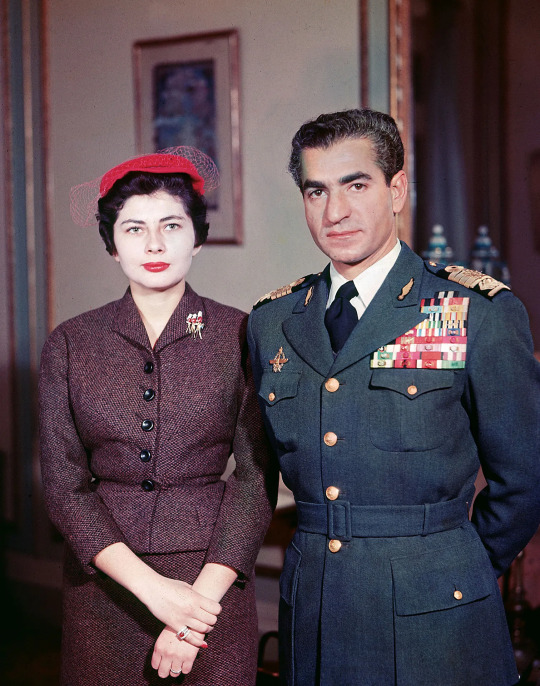
Reza Pahlavi and his wife, Princess Soraya, Ardra Stellium (sun, mercury & venus)
Soraya was his favourite wife and supposedly his "true love", but since she was infertile and he had no sons from his other marriage, he had to divorce her to marry another woman, Farah Pahlavi, Ardra Moon, Magha Rising (who did end up giving him 2 sons out of 4 children). Soraya lived in Paris following their divorce and did fall in love again but she did not live a very happy life (her partner died in a plane crash). Farah Pahlavi's reign as Queen was cut short by the Iranian revolution following which both Reza & Farah were exiled from their own country, they lived in many places, Reza passed away 2 years into exile and Farah has since lived in obscurity in the United States. 2 out of her 4 children committed suicide and it is widely assumed that the family has gone broke.
Tragedy can happen to anyone and no nakshatra or planet will protect or prevent it but Rahu influence creates sudden gains and losses. What is quickly gained is also quickly lost. This is why Rahu is deeply connected to entertainment because not only is the entertainment industry entirely illusory, it also does not guarantee anything. You're a glorified freelancer basically. If you're not wise, you can lose everything in minutes. There is so much temptation all around you, you're surrounded by so many false promises and its very easy to lose yourself in all of it. We often see celebrities and idolize their easy lives but very very very few get to be stars their whole lives and live lives of convenience and comfort. For 90& of people its a very scary, tragic, difficult experience of immense highs and lows.
Nodal success feels dissatisfactory because Nodal people are unable to ground themselves in anything solid (unless other aspects that can do this are present) its very very easy for them to lose themselves in Maya or to be so completely detached that they do the necessary "maintenance" work that it takes to be a fully involved human being in anything.
Many say that the reason Farah Pahlavi's life was so tragic was because she took Princess Soraya's rightful place and Soraya's sadness had "cursed" Reza & Farah's marriage. that's stuff of urban myth but don't you think its interesting that a woman who wasn't of noble birth, rose to the ranks of Queen at the age of 21, lived a life of luxury very few can even conceive of and produced 2 male heirs!! which is all that the King wanted🙄🙄but ultimately none of it mattered? Reza having an "heir" made no difference because the Iranian Revolution overthrew the monarchy, they had to leave their palace, their luxuries, their maids and servants and every kind of comfort behind to live like nobodies in exile. They watched their treasury grow smaller and smaller year after year and obviously, no one was used to "working" so nobody got a job to take care of themselves or the others (I mean Farah and her 4 kids btw). They can never go back to their homeland or regain what was once lost. They're in a position that very few (other exiled royals) can relate to. They are socially and culturally isolated. All of these are Nodal themes.
Another Princess with nodal placements and a similarly tragic life is Princess Diana, Ardra Sun & Mercury with Moon conjunct Ketu
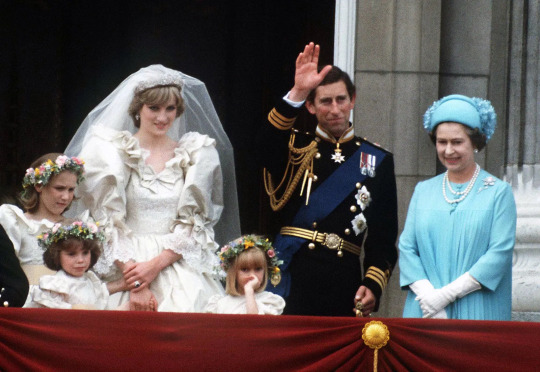
There are many royals who've lived more moderate lives or less tragic lives. Having it all and losing it all is a very Nodal theme.
It reminds me of SUGA's Interlude by Halsey (Swati stellium) where she sings:
I been trying all my life
To separate the time
In between the having it all
And giving it up, yeah (Hey)
I wonder what's in store
If I don't love it anymore (Hey)
Step between the having it all
And giving it up, yeah (Hey)
Success is a very illusory experience for these natives. Its like trying to build sandcastles on the shore. I am by no means suggesting that Nodal people can't be successful, just that if they depend on "success" to give their life meaning, they're setting themselves up for failure. You ruin anything you singlehandedly obsess over, its important to know when to stop, when to withdraw.
These natives tend to go to extremes just to feel something
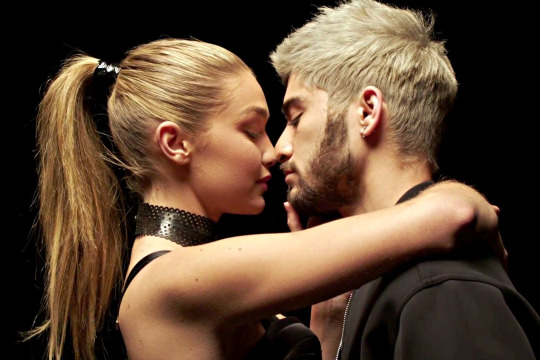
Zayn Malik- Shatabhisha Rising and Gigi Hadid- Ashwini Sun & Rising
idk anything about their sex life together but if we're to go by the songs then its 👀 giving bdsm
After that horrendous Revati video that Claire did years ago (and has deleted since I think) people associate BDSM, sexual deviancy and all around freakish behaviour with Revatis but you know who is actually crazy in bed? Nodal people
pornography impacts the brain much like an addictive drug by triggering ever-increasing amounts of dopamine. Over time, the brain builds up a tolerance to the excess dopamine and requires either more access or more extreme content (or sometimes both) to achieve that same level of perceived pleasure. In short, when viewing pornography, your brain gets less pleasure while wanting more, often causing desensitization and an escalation in behavior.
Kanye West, Venus & Mars in Ashwini
Kanye West's first encounter with sexual desire came during early childhood, fueling a dependency on sex that would set in during adulthood. “My dad had a Playboy left out at age 5 and it’s affected almost every choice I made for the rest of my life," West told Elle in 2019. "From age 5 till now, having to kick the habit and it just presents itself in the open like it's OK and I stand up and say, ‘No, it's not OK.’” The singer also credited his faith in God with helping him overcome his struggles.
James Franco, Ashwini Sun
Actor James Franco developed an addiction to sex while he was recovering from an addiction to alcohol. On The Jess Cagle Podcast, he admitted to sleeping with students who were attending an acting school he previously ran. “It’s such a powerful drug,” he said. “I got hooked on it for 20 more years. The insidious part of that is that I stayed sober from alcohol all that time.” Since 2016, Franco has been in recovery from sex addiction and continues to work towards a healthy lifestyle.
Billie Eilish, Mula Stellium (Sun, mercury & ketu)
Billie Eilish went through her own struggles with pornography addiction after viewing her first pornographic video at only 11 years old. In an interview on The Howard Stern Show, the "Bad Guy" singer said she used to watch porn to feel like "one of the guys," but has since distanced herself from it entirely. "I think it really destroyed my brain and I feel incredibly devastated that I was exposed to so much porn,"
Charlie Sheen, Mula Moon
he is a pretty well known sex addict and sexual assaulter :/
Michael Douglas, Mula Moon
He's been candid about his struggles with alcohol and sex addiction. Michael even went so far as to say that his throat cancer was caused by performing oral sex on so many women.
Every good thing can be "bad" if its used as a coping mechanism and this includes sex.
Ketuvians are like black holes that absorb all the light, they have to suck everything in. They absorb easily but they don't feel rooted in anything beyond a short period of time.
many say that Nodal natives have no moral compass or that they're thrill chasers or that they're not "good people" but honestly Nodal energies are just really hard to master. some people turn it into art, or work or something else where they can channel their obsessive energies fully without holding back. compartmentalizing things is hard for these natives so its important to have areas where you can go all out whilst exercising some modicum of boundary or balance in others.
Maladaptive daydreaming is another big struggle for Nodal people. they're also prone to nihilism and cynicism because they can't enjoy life in the same way as they need a lot of stimulation (they're desensitized to ordinary levels of stimulation of any kind). This means they struggle to find meaning in life. Apathy is their natural state of being. Its just hard to care because in order to care you have to be firmly rooted which Nodal people are not.

This is a quote by Werner Herzog, Ardra Moon who is a filmmaker known for his nihilism and scepticism.
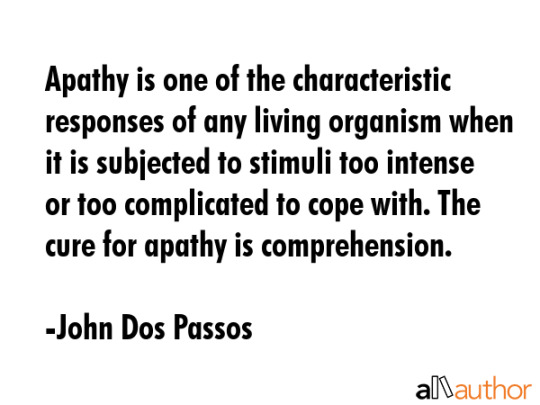
Dos Passos did not have any major placements in any Nodal naks save for his Mars in Mula and Rahu in Shatabhisha but I thought his quote by him really explained things
The real danger of Nodal influence is the indifference and apathy that its natives experience. But Nodal influence is such that you have no place in reality, you exist in the shadows, you live behind the curtain, when your whole life is one long tunnel its hard to "care" or be immersed enough to fully take in their feelings. Nodal natives experience emotional impermanence which means that if you do not actively see proof of or feel a particular emotion, you believe it does not exist. they have to consistently see "proof" of your love for them to believe you. they seldom believe that the feelings others have for them are "real". they think they are the only constant in their life.
its hard for these natives to be passive and consume something without interacting with it. Moon dominants thrive in passivity whereas Rahuvians need to become one with that thing to truly experience it. Ketu also craves this sort of complete union but its different since Ketu pulls you into themselves whereas Rahu wants to pull themselves into you.
Nodal influence creates natives with a very nebulous self-perception and identity. They do not know who they are, they are a mystery even to themselves. Do you ever talk to a guy and think that he has no personality because its hard for him to list favourites or describe what he likes or dislikes etc? He probably has Ketuvian influence. Ketu people try on new aesthetics/personalities like its a makeover game, for a couple of months they'll have a hippie phase, now they're emo, later they're into retro glam or whatever. they like to try on different personas to see which one they like the best, i know this sounds kind of creepy?? but its truly because Ketu natives lack identity and rely on external things to give them a sense of self. This is why they're very uninvolved in the lives of others. They cannot give themselves too much because they dont know enough about themselves to "give" to others.
In vedic mythology, at the beginning of time when the devas and asuras churned the ocean of milk to extract from it the amrita (the elixir of immortality) Mohini, the female avatar of Vishnu, started distributing amrita to the devas. However, one of the asuras, Svarbhanu, sat in the row of devas and drank the amrita. Surya and Chandra noticed him and they informed Mohini; however, by that time, Svarbhanu had already become immortal. Vishnu, as Mohini, cut off Svarbhanu's head with his discus. Svarbhanu, henceforth referred to as Rahu and Ketu, could not die, but his head was separated from his body; his head came to be known as Rahu, while his body came to be known as Ketu.
Pertaining to this origin story, I have noticed how people with Nodal influence seldom benefit from "nourishing energy". This could mean they were neglected as children, lacked a good family environment, were abused or taken advantage of by others in their life (all of this is also subject to other placements in ones chart). Svarbhanu was a demon who temporarily became immortal because of a mistake. Like I mentioned with fame and success before, these natives struggle to "maintain" what they achieve, especially because their early lives were marked with deprivation of some sort. This could also mean absent parent figures. But there is a sense of "you shouldn't have been where you were".
Rahu energy manifests often as a very manic hyperactive energy
youtube
Ranveer Singh is the best example I could think of. He is known in the media for being an eccentric, hyperactive, loud cokehead lmao
He has Ardra Sun, Shatabhisha Moon
Ketu energy is more detached, more reserved, still weird and chaotic but overall less "hyper"
youtube
This interview with Lady Gaga is a good example, usually the people being interviewed are walking or moving around and trying to pretend its not scripted but she just sat there for the whole thing lol
Gaga has both Rahu & Ketu influence
She has Rahu in Ashwini in 1h as well as Swati Moon conjunct Ketu
i know i said last time ill make a post about the positive manifestations of nodal influence but its gonna have to wait a little longer 😬😬these are just some things i observed and i thought i should share them. hope this was informative.
#astrology notes#astrology observations#sidereal astrology#vedic astro notes#nakshatras#astrology#vedic astrology#astro observations#astro notes#astroblr#jyotish#rahu#ketu#ashwini#magha#mula#shatabhisha#swati#ardra#Youtube
227 notes
·
View notes
Text
whispers softly Come here. No, come closer. A bit closer. Perfect.
I know neoliberal is just code for dumb stupidhead if you're a leftist who doesn't read theory, but I need all of you to know that Adjudicator Shrue isn't a neoliberal.
Neoliberalism specifically advocates for deregulation, for a free market with very little government interference and for privatization of various (traditionally government owned/regulated) industries. It's often associated with trickle down economics is a largely conservative ideology.
Where does Shrue give any indication that they align with these principles? Shrue is anti-war, pro government, and a highly principled person that is not driven by money.
I'd say that in season two, during the reelection campaign, Shrue presents more as a liberal identity. They're concerned with optics, with PR and with making the right move in order to get reelected. However they also stand by their principles and remain relatively honest. They want progress, but the progress they're searching for is far from radical and they're not particularly fussed about how soon it happens.
By the time we first see them in season 3, it's clear the war has radicalized Shrue a bit. They're jaded, tired and they never wanted the war to begin with but now they have to contend with it along with all the other remaining pieces on the board. They're moving more left on the scale. They stand out among the crowd as an "alternative voice" but they aren't too different, they still largely adhere to the same beliefs about sacrifice and religion.
At the point in the series that I'm making this post (post episode 39), it's safe to say that Shrue has been fully radicalized by the exposure to the full evil that encapsulates their government. It's unclear what policies Shrue will take from here on out in public, but in private we know Shrue does not hold any of the same conservative beliefs that the other politicians do. They hate the corporatism, they hate the money talk, and they hate the manipulation and the lies. This is no neoliberal.
I'm not just saying all this to sound like a nerd or like I'm smart. Shrue's political beliefs have genuine impact on the choices they'll make in the future and on the narrative. It's important to understand the media you're engaging in and the full weight behind it. You might think Shrue is an idiot, but they're not a neoliberal.
#okay i'm stepping off my soapbox now#you know youre a political junkie when seeing the words neoliberal and shrue right next to each other sends you flying into essay mode#but seriously#stop calling them a neoliberal#tsv#the silt verses#adjudicator shrue
149 notes
·
View notes
Text
A Sermon on Desire
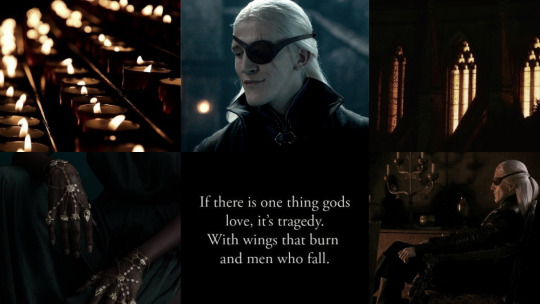

Aemond x Abeni of the Summer Isles (oc)
Summary: Vexed and nearly at his wit's end, Aemond Targaryen, in a rare moment of weakness, seeks refuge in the Sept. Will a chance encounter give him the divine answers he seeks?
Warnings; NSFW 18+, oral (m receiving), smut, alluded praise kink, overstim, teasing, edging, sexual tension, religious guilt, p in v sex
A/N; a collab w/ the lovely @bottlesandbarricades 💕💕💕, the sheer fun I had brainstorming and writing this in DM's with you is indescribable and I adore you 💕💕🥰
Word count: 6.4k

Torn.
That was the best way to describe it, the feeling of being pulled in so many different directions. Of being stretched so thin that it wore at the very threads of him until he had one choice left but to let the weight of the tension, the expectation and ultimately the guilt swallow him whole.
It was an amusing thought really, for a man, a prince to boot, one who prided himself on presenting a front of perfection to the world, to be in such a state of disarray behind closed doors. That his internal identity would be so fractured and contradictory with a crack running through his core that was as deep and jagged like the scar on his face, splitting and dividing his very soul until he strained under the weight of duty and loyalty that would always be his burden to carry.
He would never truly be able to balance the scales or quell and silence the whispers that he was not Targaryen enough; not Hightower enough that dogged his every move no matter how hard he tried. It was like trying to combine oil and water, a seemingly futile effort.
An endless cycle where one would always outbalance the other like an elixir that would forever be just out of his reach. After all, there are no chartered courses for second sons, no preset destinations but to be adrift, left to rot and rust and bob aimlessly in the harbour.
For as long as he could remember, he could always feel it, the restless pull of the tide that clung to him like an iron lock with no key fastened around his ankle, leaving him with no set route as the moorings suffocated and closed in on him, all but dooming him to drown in doubt as uncertainty began to gnaw at him, eating away at his insides like wildfire as he blindly grasped for some form of conviction and purpose.
**
True faith was still a mystery to him, the worship of the gods, both old and new. It had never quite come easily to him, not in the same way it did for others, like it did for his mother for example, who never seemed to doubt her unwavering belief in the Seven for even a moment, wearing her piety like it was her shield, her armour. He remembered, before he’d lost his eye, obediently trailing behind her as a child every time she had visited the Sept, kneeling beside her for hours till his knees ached, never saying a word. Never questioning, always obeying.
Then came the conflict.
As he grew and his studies progressed, his youthful past ignorance gave way to newer thoughts. With the more he learned, the more knowledge he gained and acquired, the more he struggled to reconcile the queer customs of his ancestors, whose Gods seemed far more liberal in regards to the strict doctrine of the Seven and what which was regarded as sin by the several aspects expressed within the pages of his seven-pointed star.
So he did as he'd always done, turning to books and using them as a means to escape. He’d tried to read his way out of his emotions and doubts, searching for the divine within the pages and the walls lined with books, rather than at the foot of an altar.
He studied them all. From the Old Gods of the North and the Drowned God of the Iron Islands to R’hllor of Essos and beyond, translating the writings of the Moonsingers of Braavos and the Ghiscari Graces of Slaver’s Bay and deciphering the stories of the Great Stallion of the Dothraki and the lesser-known beliefs of the Summer Isles.
He found parallels and contrasts within them all, common threads and other little details that bound them together and highlighted the differences so distinct that showed how they were truly worlds apart.
But what was the truth of it? Who had the truth of it?
He persisted nevertheless, soldiering on as he poured over volume after volume after volume of various religious texts, hunched over at of the many tables in the Keep’s library night after night, tracing the scrawled words with both eye and finger, his only source of light being the candles he had burning late into the night, blinking as he felt the exhaustion slowly set in, the words and ideas began to blur together, the lingering thought that there had to be answers, and that one way or another, he would find them.
The lingering knowledge that he knew there was a possibility that he would never truly understand remained, for there seemed to be no closure to be found, and his faith stayed unaffirmed, and instead of the enlightenment he sought, it felt like the exposure had infected his mind as the questions only seemed to multiply.
Aemond sought distraction after distraction as he chanced on books of a more sinful nature and rife with temptation. Something to take his mind off the thoughts of lost faith that swirled and uncertain guilt which lurked in the pit of his stomach. He knew he would marry one day, that he would be tied to a girl of some noble House that in the end, would bolster Aegon’s claim when he was placed on the Iron Throne. After all, that wasn't always the plan?
He knew that no matter what the other Lords loyal to his elder half-sister wanted to believe. What his father refused to see. That as harsh as it was, the truth would never change, and it was both by precedent and by his right as the firstborn son, the Iron Throne would always be his brother’s. Aemond would do his duty, as he always had, shouldering the weight of his duty with a stiff lip and an even stiffer spine, letting his reservations and his bitterness fester on his tongue like spoiled sour wine.
**
He had been in the Sept for hours, having slipped past the great doors after the sun had set the night before, one thought on his mind. His knees had long since grown numb and stiff from the cold as he knelt with his hands joined before him in the silence, suffering the pain with a quiet stoic dignity, alone save for the incense swirling around him in opaque wisps, silently repeating the many prayers that had been ingrained in his core by his mother and the Septons as soon as he was old enough.
For what was pain in a place like this? A place where his Mother’s gods were watching and judging his every move? That’s what he hoped anyway, what he so desperately wished to believe. Then again, if these were the true Gods, then surely they would see through this facade of false piety he performed for the sake of appearances, that they would see him play out this false mummery of deceptive devotion daily. Part of him wondered if this was his punishment, that maybe the Gods remained silent to torment him further. After all, did he, of all the people in this city, deserve absolution?
There was a feeling now as he knelt, seeing his face reflected in the polished marble. A strange, out-of-body feeling washing over him that he, with his silver hair and violet eye, had no place here.
His musings were cut off when a small noise pulled him from his thoughts, a signal that he was no longer alone. His head jerked as the faint sound of bells broke the stagnant quiet, body twisting around to see a woman standing in the centre of the Sept with her head tilted backwards. At first glance, he supposed she must hail from the Summer Isles, judging from the feathers so sought after by the ladies of the court upon her garb.
Her hair was long, swept behind her and braided and adorned with a hundred little gold beads woven throughout that chimed as she moved. Her dark eyes drifted curiously over everything, from the statues of each godhead, from the pale stone and hints of brushed brass to the votive offerings and low burning candles to the vaulted ceilings and high windows, which cast streaks of light onto the polished slabs.
Aemond groaned as he stood, the cold of the Sept’s floor little help to his aching limbs, the sound faint yet loud enough for her to hear over the distance. Her sandalled feet were almost silent, save for the low sound of her heel clicking softly on the cool stone floor as she turned around, catching his eye upon her, flashing a set of pearly teeth as she sauntered closer towards him.
“I’ve never seen a Sept before,” she explained in a hushed voice so as to not disturb the tranquillity. “It is very… dark.” Her accent was unusual to his ears, yet her common tongue was excellently spoken. “And cold,” she added, rubbing her bare upper arms as gooseflesh prickled across the skin. It was then that he noticed the other bits of gold that adorned her, the delicate bangles enclosing her wrists and the intricate bands of gold in her ears and at her throat.
Aemond noted that her dress was more suited to a warmer climate, brightly coloured and richly embroidered, it stood out vibrantly against her skin, making the Sept itself look almost plain, commonplace and colourless around her. Sleeveless and cut away at the waist, it revealed more flesh than anything he'd seen worn by even the most daring Westerosi women of high fashion. It was very much the sort of thing that his Mother would turn her nose up at in silent judgement as a moral failing and default of character, yet Aemond could not find fault in her appearance.
Whoever this stranger was, there was no doubt that she was a woman of means.
“I cannot feel the Gods here I fear.” The stranger sighed, running her ringed fingers along the smooth surface of the altar. “This place is beautiful, yet it feels closer to a crypt than it does a place of worship. So still, so silent and lacking life.”
A crypt. Aemond had never considered how truly alike they were, remembering all the times when he had wondered if he was talking to the dead, rather than the Gods his mother so cherished as he knelt at the altar with his hands joined.
"It is more open where I am from," she said, and he could hear the fondness she had for her home. "We are a freer people, ones not so restricted as you are."
Aemond realised now that he had not yet spoken a word, though that did not seem to bother the young woman, who seemed content to continue her observations without his input. As if he were one amongst the statues of the Seven, himself. A silent observer constructed of carved marble.
The opportunity to take his leave came when she turned away from him to admire the figure of the Stranger, allowing him to slip away like a ghost and leave the Lady to continue her explorations in peace.
**
The blistering sun, already high in the sky, beat down on the city when he stepped out from the gloom of the Sept, hit almost instantly by the dazzling sunlight and the dry air of the city. It took a moment for his eye to adjust, the pupil expanding and contracting as it grew accustomed to the brightness, his relief disturbed only by the twinge of pain behind his eyepatch.
"You are Prince Aemond Targaryen, are you not?" He stopped at the sound of his name, not having noticed her following him. His pause gave her the chance to catch up several steps behind him. "I've heard of you."
I’ve heard of you.
They were words Aemond was not fond of hearing, knowing that his reputation left much to be desired. He remained silent as a muscle ticked in his jaw, only letting out a hum of affirmation in response, squinting through the bright sunlight. Amusement danced across her face as her lips twitched, her gaze sharp as she studied him from where he stood before her. "You are the rider of the largest dragon in the realm. Or so I heard."
“Yes,” he answered stiffly, his throat feeling as dry as the dirt under his boots. He’d never been the best at small talk, for it was an art he had no natural skill in and even attempting to converse when the topic surrounded himself was a task of even greater difficulty, as well as one he fervently disliked.
"Dragons are almost all things of myth, where I come from, beasts of legend and lore," she said lightly, excitement written plainly across her fine features as she talked. “What a blessing it must be to be bonded with such a creature such as yours.”
Aemond turned to face her, grateful for the change in conversation. “I don’t believe I have caught your name?” he asked, breaking the silence.
"Abeni of the Summer Isles, my Prince."
Bold and self-assured, she offered a small bow. It was graceful, yet unsteady enough Aemond could sense it was unpracticed. “I apologize if this is incorrect. I am not quite as familiar with Westerosi greeting practices,” she laughed, causing Aemond’s mouth to twitch upward at the sound.
“You are far from home then, my Lady,” Aemond replied, clasping his hands behind him. Encased in his leathers as he was, the sun on his back was uncomfortable, beads of sweat forming at his temple and under his collar before sliding down his spine.
She let out another laugh at that, richer than the last. “I am, indeed. Though the world seems not so vast when you have a fast ship," she said as she glanced his way, "Or a dragon, I suppose.”
“Pray, what brings you to King’s Landing?” He enquired politely, courteous as always.
“A little business, a little pleasure.” Abeni smiled playfully, streams of light catching in her dark hair, as black as a raven’s wing. A breeze wafted in off the bay ruffled against her skirts, sending perfume wafting towards him, a rich scent that carried undertones of something floral that he could not name. “Alas, for now I must return to my ship,” she murmured apologetically, “It was a pleasure making your acquaintance, my Prince.”
Aemond bit the inside of his cheek as he struggled to find words, hampered once again by a stilted awkwardness.
“I could show it to you sometime,” she offered, sensing his discomfort. Her ability to read him was rather unsettling, if not intriguing. “If you wish, that is? I would never seek to presume-”
Aemond flushed, color flooding his face when she smiled, eyes alighting with delight. “Of course,” he agreed hastily, the warmth of her natural charm and charisma putting him slightly more at ease. He cleared his throat, “My Lady.”
**
She'd been in the city for several turns of the moon when restlessness began to set in, the itch for adventure and return to the sea growing day by day, and had taken to spending most of her time on the docks, where the stink of the city was lessened slightly by the sea air, and Aemond, more than desperate to escape the stench of death as the King grew weaker and weaker, had grasped the opportunity for what it was with both hands, taking her up on the offer.
The first time he had seen her ship, he had been more than a little in awe of it, listening with one ear as she spoke. The name, she had murmured, was a rough translation from Summer Tongue as The Wanderer in Common Tongue. He knew little of that particular ship, but had read bits of how swan ships could sail faster than galleys, but without wind to steer them, were useless, not that Aemond was well versed in the usefulness of ships and their qualities.
It was truly a marvel to behold the longer he had looked at it, the curving, swooped lines adding an elegance to its design. The red-stained varnish that coated that exterior of the vessel was constructed from set it apart from the other, duller ships, the shade of it not too dissimilar to the stones of the Red Keep itself, and it seemed more of a work of art than a functioning ship, befitted with large white sails and finely carved figureheads of various birds.
“I hear the skull of the Black Dread resides in your Keep, my Prince.”
Her voice came from his blind side, and he startled, half turning towards her when he felt her hand slide to rest in the crook of his elbow. He tilted his head down to meet her gaze, looking down his nose at her. "Abeni."
The strength of her grip on his arm was unexpected, but not surprising from someone who spent most of their time, if not all of it, at sea. “I would like to see it,” she added, looking at him expectantly. “If you would indulge me?”
**
The reds and oranges and yellows candles lit before the massive dragon skull are reflected in her eyes, adding more warmth to the rich hue. Aemond wondered what she was thinking, whether she was envisioning what the Conqueror’s dragon had been like before age claimed him, and Meraxes decades before, leaving Vhagar as the last living remnant of the Conquest.
His eye widened when she muttered something under her breath, the all too familiar tones of High Valyrian falling from her lips. “You speak Valyrian.” Aemond commented, failing to hide his surprise. A new light dawned in his eye as he looked at her, one that was an equal combination of enthrallment and carefully concealed curiosity.
“I speak a few languages,” she shrugged, not tearing her gaze from the skull before her. “During my studies, I found many errors in the translations by the ones you call Maesters.” Abeni explained, running her hand along the side of the skull. “It was then that I realised that if I truly wished to understand a text, it was best to do so in its original tongue.” She said, moving her fingers higher, edging closer to the rows of jagged teeth.
A kindred spirit? Aemond’s blood burned with excitement at this newly revealed common ground. Written word after all was one of his favourite pastimes. Devouring philosophies and histories in the same manner most men consumed meat and ale. “The attitude of a true scholar.” Aemond smiled subconsciously as he moved closer. “I have come across some truly shameful translations in my time. Ones that were pitiful, to say the least.”
"Oh?" This seemed to have caught her attention as she pulled her eyes from the skull to focus on him. The low glow of the candles illuminated her curious brown eyes. "What was this mistranslation?"
"It was one of the more depraved texts," Aemond responded, "Something about Valyrian Dragonlords entering sexual congress with dragons to achieve their bond.”
“Blood of the dragon, indeed,” she laughed. Her face shone with excitement at this new matter of conversation. “I, myself, am inclined to believe the bond was forged as the result of blood magic - spells and such.”
“Tis a ridiculous notion. There is no evidence for copulation with dragons,” he huffed indignantly. “After all, the people of Old Valyria would not have engaged in such…sexual immorality. They were a five thousand year old civilization who were…” he fell silent when something flashed across her face. Whatever it was, Aemond could not tell.
“When it comes to texts that have been translated by someone within a religious sect,” she kisses her teeth, “I am always suspicious of a suppression of truth to serve an agenda, my Prince.”
“I think it is always unwise to pass judgement on sexual behaviour between those willing and able. Who gets to determine what is moral and correct, but the Gods themselves?” Abeni continued, her words sharp.
“The Faith is very clear on sin. On wanton depravity and mindless fornication like we are naught but beasts,” Aemond replied, and for a moment he had surprised himself, it felt as if his mouth had moved of its own accord and his Mother’s words had come tumbling out.
Like a red rag to a bull, it only seemed to infuriate her more. The scalding realisation washed over him then, the implications of his careless words. She stiffened, crossing her arms across her chest as she raised her chin defensively. “In the Summer Isles, The arts of love are a holy skill,” she said hotly, eyes bright. “Tis not something to be ashamed of,” she snapped, too angered by what he had said to remember who she was speaking to.
“I.. I was not suggesting anything-” he babbled, fumbling for words. “I only meant that-”
"Is this not what the gods have fashioned us for? To love and be loved?" she challenged, her accent growing more with each word she spoke. "They've fashioned us in their image," she continued vehemently. "Gave us our hands to build and our voices to sing.”
“I-” struck speechless for once, the words he’d wanted to say would not come, as if they were trapped, locked within his throat by some higher being. “The faith-” he said finally, albeit weakly. “I believe that-”
“I don’t believe you,” she bit out. “I watched you in the Sept," she admitted, her vehemence fading slightly, her shoulders slumping. “You were there out of duty, not to show devotion to your Gods.”
He blinked as she raised a brow, studying him before she crooked her finger in his direction, beckoning him closer. “I want you,” she murmured quietly when he was within reach, one hand gripping his shoulder as she stretched up on her toes to brazenly brush a kiss along the ridge of his cheek. “Tonight, before I depart,” she clarified. “Let me show you what your Gods of cold marble deny you. What you deny yourself in worshipping them.”
His hands curled and flexed at his sides, brow furrowing as apprehension settled over him. “Not here." he said, feeling his skin begin to prickle uncomfortably, for though the dragon was nothing more than a time-darkened skull, Aemond still felt the weight of it behind him, heavy and oppressive as he wrapped his fingers around hers, tugging her from the room.
**
Within the privacy of his chambers, they were a tangle of limbs as her hands moved over him, her fingers nimbly undoing the clasps of his tunic one by one before moving onto his breeches, and lastly, his boots.
Her gaze trailed over him from head to toe when he finally stood bare before her. The expression on her face was carefully set, yet he could see the slow stirrings of something in her dark eyes. Before he could even utter a word, she had stepped even closer, her breath puffs of air against his cheeks. She trailed the tips of her fingers up his face, stopping on the raised skin just below the not so innocuous square of leather of his eyepatch. His last shield; his last defense to hide the cavity where the sapphire stone sat in the ruin of his eye.
Her eyes flicked up to his when he curled his hand around her wrist, stilling her movement. “Don’t.” He murmured, swallowing his relief when she didn’t push. He let his hand fall back to his side as he watched her, his eye following the path of her fingers as they moved over the line of his shoulders and the planes of his abdomen, each touch of her hands on some part of him cool on his scorching skin.
She stepped away suddenly, her hands reaching for the strings that held her dress together, twirling them around her finger slowly until the garment pooled at her feet. His eye stayed on her as she turned around, glancing once over her shoulder at him, one hand on the edge of his bed.
“I quite like you like this,” she murmured after he had scrambled behind her. He flushed, large patches of red dusting across the fair skin of his cheekbones and across the base of his throat, an almost unnoticeable tremor in his hands as his long fingers flexed at his sides.
“Like what?” he swallowed, feeling the shame that welled inside him at her words, potent and as rich as summer wine.
“Debauched,” she briefly settled back on her haunches to survey him, trailing her fingers over his stomach teasingly, watching with rapture as the muscles shifted under his skin. “Beautiful,” she added after a pause. She shifted suddenly, the bed dipping under her weight as she leaned forward, brushing a loose strand of his hair back.
Aemond shuddered, the sensation of her fingertips ghosting across his skin sending sparks shooting through him at her praise. “What are you doing?” he stammered the words, panting and wide-eyed. His heart began to beat a rhythm against his ribs, skin glistening in the low light of the candles from the fine sheen of sweat that coated his skin and pooled at the base of his throat.
"You are too tense," she demurred, hovering over him as she pressed him backwards, threading her fingers with his. His breath hitched as the ends of her hair brushed across his stomach, the sensation raising a wave of gooseflesh across his skin. “Relax,” she clucked her tongue, pressing a kiss to his hip.
His mind spun, any and all thoughts that had been in his head disappeared as she retreated, going lower with a singular focus. Her movements were lazy and unhurried, each slow and tormenting swipe of her tongue along the underside of his cock driving him mad.
He tried to think of something, anything, to distract himself from the sight of her between his thighs, but failed, squeezing his eye closed so tightly tears leaked from the corners, the feeling of her mouth on his cock ripping a strangled, ragged moan from his chest as his muscles spasmed, going rigid as he stiffened.
Too much. Too much.
And yet he wanted more.
For how could depravity be so beautiful? This was not like the base and corrupt like that in which Aegon indulged. Not immoral or degrading. It was exquisite pleasure as natural as breathing. A sublime thrill. Pleasure for pleasure's sake. Not born of duty, but of something else.
Something else that could not be found in any holy text.
The exchange of heat. The exchange of energy. Finding balance at last. Giving and taking. Back and forth. Achieving an elevated state of being for but a brief moment, to make you thank the Gods you were alive. A blessing in more ways than one. For what was worship if it was not warm and soft and loud and joyful? It was not meant to be cold and hard like marble beneath his knees, nor made of silence and sorrowfully murmured scripture.
Aemond jolted, squirming as she nipped at the skin over his ribs, and again when she licked a stripe down his stomach before blowing air over it. "Please," his voice cracked as a fist tightened at the base of his spine, the veins in his hands growing more pronounced as his hand slapped against the bedding, bunching the sheets in his fist. His head fell back, a silent plea building on the tip of his tongue as the warmth of the room seemed to close in on him, suffocating and unbearable.
She retreated, stretching like a cat as her fingers trailed a path over his shoulders as she leaned down to brush her mouth against his, the friction of her body sliding against his too much, yet not enough. “You are temptation in the flesh, come to torment me,” he exhaled raggedly against her skin as his hair spilled behind him, sliding over his shoulders in silver waves, so locked within a haze of lust and pleasure, he didn't know where his body ended and hers began.
“There is no shame in it," her legs tightened around his waist as she grasped at his jaw, pulling his face away from the side of her throat. "Let them hear you.” Her words slipped into a tongue foreign to him then, and though their meaning was lost to him, their sentiment transcended spoken word. It felt like flying. Like he was weightless. Like he was floating on water and untethered from all mortal bonds without a care in the world.
He mumbled her name, once, twice, three times, a desperate cry clawing at his throat at the high that swept over him with a force so violent it knocked the breath from his chest before he fell boneless and limp on his back beside her, panting as he fought to regain control of his breathing, reduced to nothing but a patchwork of trembling limbs and frayed, ragged edges.
**
“It’s futile asking you to stay, isn’t it?” Aemond murmured quietly. He felt her as she moved in the dark, from where the length of his arm pressed flush against hers. He could hear the small ornaments in her hair chime as she moved, the delicately worked gold warm against his skin. The bed shifted as she turned onto her side to face him, propping one arm underneath her.
She inhaled deeply, running the end of her tongue over her teeth as she mulled over her words. “Tis futile as asking you to come with me, I imagine. You have a duty here, my Prince. One that binds you to your family." She smiled sadly at him, brushing the pads of her fingers over the sharp angles of his face, tracing them down from the top of his head all the way to his jaw and back again in a soothing motion that brought forth a deep sigh as his eye fluttered closed. Aemond could hear the sorrow that she could not quite hide, an undercurrent woven just under the surface.
He did not push, instead returning his gaze back to the hangings over his bed as a fresh wave of conflict began to form inside his chest, twisting and writhing inside him. He’d always been so careful, so precise in everything that he did. He was the blood of the dragon, and yet Abeni, with her foreign gods and her foreign ways, had single handedly unwound and unravelled everything he thought he knew.
She was a maelstrom, tearing through him as she obliterated and shattered his beliefs into nothing more than jagged, broken shards. And yet in a small way she had given him a miniscule taste of the freedom that she lived and breathed with nothing to hold her back.
She was right, though. The chains of duty and familial loyalty would always be constricting, too tight and too heavy for him to shake completely, and though she had loosened their pinch, he would never truly be able to escape them. It seemed their paths were only destined to cross for the briefest moment. She must go, and he must stay. Able to coexist, but unmixable. A case of oil and water once again. Time was luck and Aemond desperately wished theirs overlapped more.
Or for longer.
Afterall, what could he truly offer Abeni? His love? Possibly, one day, maybe. But nothing more than that. He was not free to marry whomever he wished. Not free to live however he wished. He knew that if he asked her to stay, her life would be constricted to a gilded cage, a prison of red brick walls filled with secrecy, the conditions in which she would wither and fade into naught but a shell of herself.
Aemond could never, would never, do that to her, not even if she was willing. He could never watch her clip her wings in such a fashion just for the sake of his desire to possess her. Like the birds engraved upon her ship, wild and untamed like a dragon, she wasn’t something to be chained as he was, free in more ways than one, free to go wherever she wished and to do whatever she pleased, unburdened by both duty and the expectations of others.
"Let me return the favour," he rasped, pulling his hand away from her hip.
She stared up at him, desire sparking again in her dark eyes. “Oh?”
"Yes." She squirmed as his hot breath fanned over her already sensitive skin as his hands drifted higher, the backs of his knuckles brushing across the swell of her breasts. He grinned at her reaction, running his nose along her throat.
"You learn fast," she observed, her arms looping around his neck as he moved, lightly running his fingers along her ribs, squeezing at her waist. As his lips grazed over her navel, he shifted off the edge of the bed, bare knees meeting the plush softness of the rug.
“Feels oddly familiar," he smirked, nipping at the inside of her thigh just above her knee. "Though I must confess the view from the foot of the altar is rarely as remarkable as this is.”
Even in the dim candlelight, he could see the wetness glistening between her legs. He teasingly dragged his fingers through the slick that had gathered, the evidence of their earlier tryst mixed with fresh arousal. Grasping the meat of her thighs to pull her closer and grant him better access, he gently spread them, admiring the way she clenched around nothing. The sight was enough to make his cock ache with renewed want where it rested against his thigh.
His eye trained upon her face with burning intensity as his arm curled around the curve of her waist, lifting her slightly to angle her hips, responding to her gasps, guided by her low moans as he slid his finger deep within her, experimentally searching until he found the spot he sought, the one that made her back arch so nicely. He revelled in her scent and in the rise and fall of her chest as she gripped the edge of the bed.
A sight worthy of worship, of reverence.
Filled with deep satisfaction at her response, he pressed forward with new confidence, running his nose between her folds, allowing his tongue to explore with tentative licks. Aemond fought the urge to smirk as he wrapped his lips around her clit and sucked.
Trial and error. Toying with pressure and the movements of his tongue. Technique evolving with the intoxicating sighs and moans he coaxed from her mouth, watching her grind her hips, craving more pressure, more friction, bowing upwards as her moans grew louder.
Urged on by the shake of her thighs, Aemond doubled his efforts. He hissed when she tugged at his hair, encouraging him further to bolder action. Delighting in the feeling of her groans and rewarded with the juices which coated his lips and chin. “Look at me,” he panted, gently grasping Abeni’s chin between his thumb and finger. Her eyes fluttered open to meet his gaze, the dark of her pupils blown wide and hazy, unfocused with pleasure.
Gods, she was a vision. A breathless beauty in a twist of sheets.
Unable to resist, Aemond softly swiped his thumb across her bottom lip before capturing her mouth with his own again, little more than a messy meeting of teeth and tongue, his lack of skill made up tenfold by a feral, ardent hunger. He was in his element as he committed every second of this to memory, swearing he would never forget this as he gripped the swell of her hips, pleased by the way she met his thrusts.
Chasing the feeling building in his gut, Aemond pressed his forehead to hers as he leaned heavily against her as his pace began to falter, only faintly feeling the pain where her nails dug into the flesh of his shoulders. His eyepatch caught in her hair as he did, slipping free from his head before falling to the side, and his breath froze in his chest. He pulled away, the lust and desire that had been there but a moment before fading. He turned his face away, tensing further at the feel of her fingers tracing over his scar.
“Why do you hide?” The feeling of her fingers drawing circles on his arm pulled him from his thoughts as she observed his face with an expression of interest, as if she was trying to read his mind. He didn't answer, keeping the marred side in shadow. Abeni slid her hand under his chin, tightening her grasp slightly as a means to make him look at her. "Why?"
Aemond searched her face, seeing no disgust or revulsion at the sight of his wound. He swallowed and fisted the sheet, throat bobbing with the movement, his sapphire glinting as it caught the candle flame, sending spots of blue tinted light over the sheets. "I-"
He licked his lip, hand flexing atop the bedding. It was as if a stone lodged in his throat, the words he wanted to say echoing around in his head, but refusing to come out.
“I need you to make me a promise, my prince.” Aemond's eye fixed on her again, watching as she bit her lip, fighting the urge to shiver when she set her hand over his. “Promise me that you will remember to live while you’re diligently toiling away for them,” Abeni smiled, a trace of sadness lingering in it. “Life is hard enough without restricting yourself from simple pleasures. Don’t forget to indulge. Please.”
He stayed quiet, pulling her to him with one hand on her back. His breath mingled with hers as he kissed her again, softer this time, as if to pour everything he could not say into it.
#my fics#house of the dragon#aemond fic#aemond x original character#fyeahhotdocs#fyeahgotocs#a song of ice and fire#hotd fics#aemond one eye#aemond targaryen#aemond the kinslayer#hotd aemond#aemond fanfiction#aemond smut#aemond targaryen fan fiction#allaboutocs#ocappreciation#oc character#aemond oneshot#aemond#prince aemond
105 notes
·
View notes
Note
Ppl think that once they reach a point of "realization" or "enlightment" they will finally live that desired life, their "dream self" will no longer be. U tell them self does not "exist" and they'll tell u:
" I don't want to be someone with a 'me' anymore, I want to drop the 'me' "
That is still somebody ,the whole reason why u will never drop the me, is because there is NO me, there is NOTHING to drop, for NO ONE.
There is no "you" that is even dreaming anything, no "you" that needs to wake up. Yes all of this is just seemingly happening, but with no one in it.
Wether your identity of "me" dies or not it still is WHOLNESS bc the idea of duality is an illusion to begin with, so nothing is actually separate. No liberation, no methods and no goals. Nonduality offers nothing but a simple suggestion/philosophy.
U can't convince consciousness its not there, bc IT ISN'T THERE, it's like telling the reflection on the mirror to wake up and be one or trying to get rid of it, like what?? It already isn't there, thats why it cant "leave"
The moment u go searching for knowledge/purpose or enlightment-it creates duality, you're creating it with the label as the "knowledge" and the "knower".
"Consciousness" will never be a successful "method" to change "your" reality as if this is loa 2.0 bc "Consciousness" LITERALLY means " being CONSCIOUS of", it DEVIDES this into that/ lake into sea/ there's a bird over there and a stone over here, which is exactly what some of yall are very desperate to get away from. (Spoiler alert its still wholness)
"Nonduality offers nothing but a simple suggestion/philosophy"
Excellent way of putting it
47 notes
·
View notes
Text
Alright folks, you asked for an essay. We all know Jade Claymore is your quintessential knight archetype. As such, she is extremely dedicated to the path she’s set out for her life. She is bound to the oaths that she’s made and while we don’t know what those oaths are, it’s easy to assume that she is entirely committed to Tir Asleen and Sorsha and, by association, the entire Tanthalos family. Due to the restrictions set upon her as servant of the crown, Jade is wound rather tight. You know what else is bound and wound up rather tight at the beginning of the season? Her hair.
Note the way her hair is constantly close to her head, making it seem rather small. She’s got these ties running through her curls for half of the journey, keeping everything neatly in place. It’s very Jade, a character for which things are rarely out of order (unlike Kit, whose hair typically flies about everywhere). There are two physical attributes Jade gets rid of over the course of the season, both of which we’re introduced to her with: her mask and her bound curls.

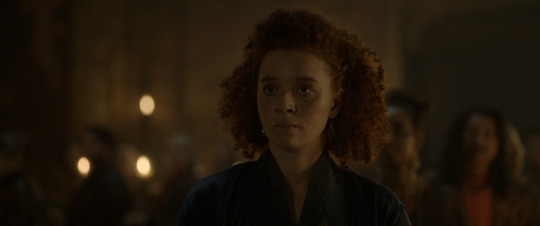

Jade's different styles in episode one. Even when her hair is out, there's always a section bound or twisted.
When we meet Jade, her mask is on and her hair is braided back. This Jade is at her most duty and honor bound and the unforeseen adventure ahead will evolve her beliefs about what it means to be those things. By the way the mask is made, it almost forces Jade to keep her hair pretty low, due to the head strap in the back. In episode three, after her mask is knocked off of her face, she never picks it back up again. The mask represents an identity that she ties to Tir Asleen and Ballantine (it’s paralleled with his helm). Kit offers to return it to her, but Jade refuses it and begins her crisis of faith and journey to discovering who Jade Claymore really is. We never see it again. This Jade Claymore died in the Pitiless Pass with Ballantine.


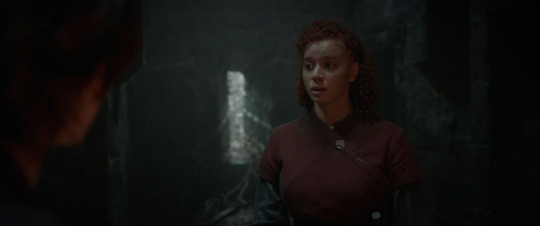
Episode two is where Jade's signature style truly begins through the next few episodes. Note the ties in her hair and how they hold it down.
In episode five, something similar happens with her hair. After Scorpia tells her the truth about her history, that she is a Bone Reaver stolen by Tir Asleen, her hair is never bound again. She loses all of the ties and strings holding it. Instead, her Bone Reaver look consists of Bantu knots that crown her head like her sister’s and fully freeing the rest of her hair. She’s accepted her Bone Reaver heritage and gone is the orphan girl always searching for family. Also important, she finally allows herself to be honest about her feelings to Kit, something that has been forbidden by the duties she’s bound herself to.
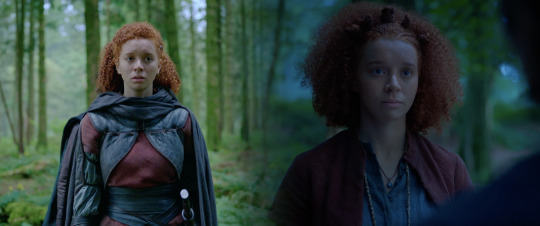
Episode 5: before and after her Bone Reaver heritage is revealed.
And as the season goes on, she continues to allow her hair to freely flow, even if it’s tied back. With every episode, it seems to get bigger and bigger until we have the ponytail she’s wearing in episode seven and eight that sits high on her head. I would argue that, despite the life threatening quest they’re on, at this point, Jade is at her happiest and most liberated. Note that she is the only one that doesn’t appear as broken down by the Shattered Sea like everyone else. She’s found her family, discovered her purpose, and has Kit.
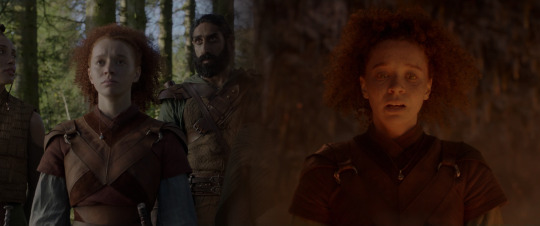

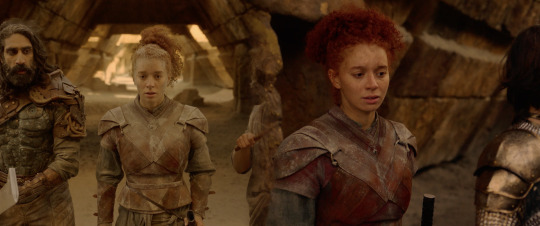
Jade's styles, post-Wildwood.
Episode eight is where she breaks her final chain: she’s finally able to admit she loves Kit in front of other people. Willow basically gives her the permission and it leads to Jade’s most important quote of the series, the purpose of her journey. From bound and restrained to a knight who understands that duty and honor means nothing without love. By unbinding her hair, Jade unshackles herself.
#jade claymore#willow#willow 2022#erin kellyman#shout out to the hair people for giving erin/jade different styles#i love the use of hair symbolism for black characters#i didn't think i was actually gonna write an essay but here we are#meta#willow meta
301 notes
·
View notes
Note
Just a quick check, as I got your blog as the "similar to a blog you follow" on a HP blog; what's your views on Harry Potter currently?
I searched your blog and found posts from 2020 about the series, but also ones about how Rowling sucks, and obviously the flag in your pfp is a bit of a give-away, but I'd like to be kind of sure. Sorry to bother.
hi! when i started this blog, back in the Obama administration, i was in high school, and i was a teenage openly trans fan of harry potter. these were the days before she was an open, raving transmisogynist spending all her money on furthering the terf agenda (or at least, not publicly). obviously we knew that there were other problems with the series, and we were, as fans often are, very critical of the source material; to me and Jamie (the other co-runner of this blog) that's actually an integral part of what fandom means. we'd even by then heard the rumours that she was a terf, but ultimately we found that unsurprising; we were both trans, it was like 2015, we were under no impression that most of the creators of the things we liked were transphobic. most people are transphobic; even now, when in american liberal culture where it is "in" to say you are not transphobic, i guarantee you most people creating our favorite fandoms are transphobic (i mean, it's not like there's a wealth of transgender superheroes, anime protags, videogame characters, etc. is it?) whether they realise it or not. this didn't trouble us because she wasn't, at the time, publicly using her platform to give this value a voice, and harry potter was just a Thing Everybody Was Into -- like doctor who, or your favorite sport, or halo or whatever.
anyway, as time progressed, the blog's followership grew and eventually i was relying on money i earn from my part writing on here, so it wasn't an option to just quit immediately when she went mask full off. and again -- we were two british trans people, we were being very loud and open about our upset and dismay over her bullshit, and by this point, had a following of over 100,000, so it just felt more productive to keep that internal critical fandom perspective & help others see why they shouldn't give her any monetary support.
we changed to a more general fandom blog theme during lockdown, when i could focus on streaming more & earn a bit from that, so it wasn't as scary to suddenly have thousands of people decide they didn't want to give me money any more because i no longer was comfortable being associated with her legacy.
ultimately, i feel proud for staying as an openly critical voice in the fandom for as long as i did -- multiple people have come to me since and told me they think the only reason harry potter isn't a notable fandom on this website any more is because we spent so much time warning people away & convincing people to abandon the fandom when we eventually left for good.
i straight up spent the last couple years saying "i fucking hate us making harry potter posts but you guys show up and reblog them & that gives me spon money through humble bundle and a tranny gotta eat"
tbh, i don't even really think that "being a fan" of something was endorsement of the work or creator at all until it became so indistinguishable from being a consumerist identity (rather than a subcultural one) which i feel like is pretty recently, and honestly, Harry Potter & the YA tidal wave in its wake are probably a pretty big part in that, but that's kind of a different discussion.
49 notes
·
View notes
Note
Would you be willing to elaborate a little on what identity politics means to you (or reblog the post if you have in the past cause tumblrs horrible search isn’t turning it up)? It’s something that has vexed me throughout my studies cause just when I think I have a handle on a working definition someone whose opinion I trust (you in this instance) says it’s wrong lol
The usage of the phrase that you're likely familiar with--the way that people often use it to-day, and the usage that I to some extent criticised in the post you're referring to--is one that basically aligns with a concept of "identitarian essentialism" or "identitarian deference." To adhere to "identity politics" is to believe that being in possession of a marginalised "identity"--being a woman, being Black, being gay--will automatically lead to a radical political consciousness, or can even stand in for developing a radical political consciousness; to reference a leader's 'identities' in lieu of debating their policies, and to fight to get people of certain 'identities' in positions of power rather than to change power structures themselves; to believe that a person of a given marginalised "identity" must always be listened to or obeyed in regards to a subject relating to that "identity" (as though people of the same identity never disagree). "Identity politics" is "listen to x voices" and black / rainbow capitalism and girlbossing and "we need more trans people in the military" &c.
But that isn't where we started out at all. The first instances of the phrase "identity politics" date to the 1970s (or possibly the '60s)--though, as is typical with terms suggestive of social or political frameworks, the ideas expressed in the term are arguably older.
The first known specific usage of the term is in 1977, in the Combahee River Collective Statement. Here, it refers to the political knowledge that can come out of “identity” (in particular, gender, class, and race), and to the necessity of reckoning with the full complexity of “sexual politics” as they interact with race and class in Black women’s lives in order to produce a truly radical politics:
Our politics initially sprang from the shared belief that Black women are inherently valuable, that our liberation is a necessity not as an adjunct to somebody else’s may because of our need as human persons for autonomy [...]. [N]o other ostensibly progressive movement has ever considered our specific oppression as a priority or worked seriously for the ending of that oppression. […] Our politics evolve from a healthy love for ourselves, our sisters and our community which allows us to continue our struggle and work.
This focusing upon our own oppression is embodied in the concept of identity politics. We believe that the most profound and potentially most radical politics come directly out of our own identity, as opposed to working to end somebody else’s oppression. In the case of Black women this is a particularly repugnant, dangerous, threatening, and therefore revolutionary concept because it is obvious from looking at all the political movements that have preceded us that anyone is more worthy of liberation than ourselves. […]
We believe that sexual politics under patriarchy is as pervasive in Black women’s lives as are the politics of class and race. We also often find it difficult to separate race from class from sex oppression because in our lives they are most often experienced simultaneously.
So the politics of "identity" do not work against a materialist analysis of class structure--they are brought up as something in addition to "pure" class politics that must be paid attention to if a materialist understanding of the factors affecting our lives is to be reached. The Combahee River Collective Statement is explicitly anti-capitalist and anti-imperialist; it was written in order to articulate a political connection between race, gender, and class-based oppression in response to environments (white, middle-class feminist organisations, Black nationalist organisations, socialist organisations) in which e.g. feminism and socialism were assumed to be in conflict. "Identity politics" asserted that race and gender mattered at all in class politics--it asserted that Black women had a right to articulate their own political position, vision, and strategy, rather than allowing white women or Black men or other communists to do it for them.
Howard Wiarda connects the early history of "identity politics" to political movements composed not only of people of colour, feminists, or LGBT people, but also "radicalized students," "Greens," and "Marxists"--"all these groups and even the term 'identity politics' itself were identified with left-wing or radical causes," with the through-line being the concept that "one's identity as a woman, a minority, an environmentalist, a homosexual, a young person, or any marginalized person made one particularly susceptible to violence, ostracism, and oppression" and that that oppression would need to be specifically countered. You'll note that several of these groups are not things that we would consider to be 'innate' to a person!
In the 1980s and 1990s, opposition to "identity politics" came from conservatives, liberals (who focused on pluralism and a non-specific sort of 'equality'), and Marxists (who lamented that they were distracting from pure 'class-based' politics). The concept of a political "identity" à la "environmentalist" seems to have withdrawn from the scene by this point, with critics focusing on identities that they claimed their opponents viewed as innate (such as "ethnicity" or gender). Marxist Eric Hobsbawm, speaking in 1996, makes what will be to us common claims: that identity politics are exclusionary ("collective identities are defined negatively; that is to say against others"); that they only allow people to hold one identity at a time ("identity politics assumes that one among the many identities we all have is the one that determines, or at least dominates our politics"--note how antithetical this is to the C.R.C.'s statement!); that they are essentialist ("Most identity groups are not based on objective physical similarities or differences, although all of them would like to claim that they are ‘natural’ rather than socially constructed"); that they are dangerous and lead to the breakdown of 'real' leftism ("the danger of disintegrating into a pure alliance of minorities is unusually great on the Left [...] without any obvious way of formulating a common interest across sectional boundaries"); that "minorities" cynically manipulate them for their own gain ("it may actually pay to classify yourself as low caste or belonging to an aboriginal tribal group, in order to enjoy the extra access to jobs guaranteed to such groups").
Let us assume that the identitarian / "sectarian" point of view that Hobsbawm criticized did actually exist in the 1990s under the banner of "identity politics"--if so, what had changed since the 1970s? Why does the term "identity politics" signify something different for Hobsbawm than it had for the C.R.C.? Keeanga-Yamahtta Taylor connects this shift to the fact that racial position has become slightly less tethered to class position:
Any concept, once it is released into the world, can take on new meanings when confronted with new problems. Identity politics has become so untethered from its original usage that it has lost much of its original explanatory power. In its earliest iteration, Black feminism was assumed to be radical because the class position of Black women, overwhelmingly, was at the bottom of society. But the civil-rights revolution and concerted efforts by the political establishment created a different reality for a small number of African-Americans. Today, there is a small but influential Black political class—a Black élite and what could be described as the aspirational Black middle class—whose members continue to be constrained by racial discrimination and inequality but who hold the promise that a better life is possible in the United States. They stand in contrast to the Black poor and working class, who live in veritable police states, with low-wage work, poor health care, substandard and expensive housing, and an acute sense of insecurity.
But, while the positions that critics of identity politics take issue with may exist in certain circles--may even exist under the self-described banner of "identity politics"--I don't think that that gets all of said critics off the hook for their portrayal of idpol (as though identitarian essentialism is inherent to it), or validates their arguments about what will solve the problem they identify (namely, a return to a halcyon past of Enlightenment universalism without attention to "identity" that, these writers hold, prevailed before 1970). In 1997, Robin D. G. Kelley wrote that "a handful of self-proclaimed spokespersons on the Left" claim that
"The Left" has lost touch with its Enlightenment roots, the source of its universalism and radical humanism, and instead has been hijacked by a "multicultural left" wedded to "identity politics" which has led us all into a cul-de-sac of ethnic particularism, race consciousness, sexual politics, and radical feminism.
Much of the blame is assigned to women, gays and lesbians, and colored people for fracturing the American Left, abandoning honest class struggle, and alienating white men who could be allies but aren't because of the terrible treatment meted out to them by the Loud Minority. Universal categories such as class have fallen before the narrow, particularistic mantras of radical chic: race, gender, sexuality, and disability. Indeed, in their view class is not just another identity, it transcends identity. If the "Left" wants to save itself, we must abandon our ever shrinking identity niches for the realm of majoritarian thinking. After all, we're told, the majority of Americans are white and heterosexual and have little interest in radical feminism, minority discourse, and struggles centered on sexual identity.
Kelley cedes that "in some circles [identity politics] has tended to limit discussions of power to cultural politics"--however, "the 'Enlightenment train' will not lead us out" of this problem:
These people assume that the universal humanism they find so endearing and radical can be easily separated from the historical context of its making; indeed, that it is precisely what can undo the racism and modern imperialism it helped to justify. The racialism of the West, slavery, imperialism, the destruction of indigenous cultures in the name of "progress," are treated as aberrations, coincidences, or not treated [at] all. They insist that these historical developments do not render the Enlightenment's radical universalism any less "radical," and those who take up this critique are simply rejecting Enlightenment philosophers because they're "dead white males."
So criticisms that relate "identity" with certain philosophies or epistemologies (here, Enlightenment humanism) and with material histories (of slavery, imperialism, land theft and genocide) are automatically assumed to be nothing more than identitarian reductionism--people are assumed to be objecting to Enlightenment philosophy merely because its original theorists held the wrong "identities"--despite the fact that that's clearly a gross misreading of the arguments actually being made. Criticisms of "identity politics" seriously overreach when they cease to criticise actual identitarian essentialism, reductionism, and deference where they appear, and instead complain that any challenge to their ideas and any mention of race, gender, or sexuality must automatically be identitarian reductionism. More than anything else this is a silencing move--they are uncomfortable with how loud "minorities" have gotten and would rather not bother to engage with any of the vast body of scholarship that analyses gender, race, sexuality, and disability through the lens of materialist or Marxist politics, or that traces the connections between race (and slavery, colonialism, land grabbing), gender, and class.
Returning to the idea that (racial, gendered, sexual) "identities" are parochial, while "class" is universal--Kelley continues:
The implications [of the arguments of the neo-Enlightenment Left] are frightening: the only people who can speak the language of universalism are white men [...] and women and colored people who have transcended or rejected the politics of identity. Moreover, they either don't understand or refuse to acknowledge that class is lived through race and gender. There is no universal class identity, just as there is no universal racial or gender or sexual identity. The idea that race, gender, and sexuality are particular whereas class is universal not only presumes that class struggle is some sort of race and gender-neutral terrain but takes for granted that movements focused on race, gender, or sexuality necessarily undermine class unity and, by definition, cannot be emancipatory for the whole.
Thus these critics presume that race and gender do not shape "universal" issues, assume that movements centering black women must only be of use to black women, ignore what "identity"-based movements have to teach them, and ignore the various ways in which these movements' goals, if accomplished, would benefit their more "universal" goals.
This situation--where only [heterosexual, abled, &c. &c.] white men are free of the odour of "identity" and so only they (and those who agree to attempt to approximate them) are able to lead "class-based" Leftist movements and articulate Leftist positions--seems remarkably similar to the situation that the C.R.C. was reacting to. Per Barbara Smith:
“By ‘identity politics,’ we meant simply this: we have a right as Black women in the nineteen-seventies to formulate our own political agendas. [...] We can obviously create a politics that is absolutely aligned with our own experiences as Black women—in other words, with our identities. That’s what we meant by ‘identity politics,’ that we have a right. And, trust me, very few people agreed that we did have that right in the nineteen-seventies. So we asserted it anyway.”
So many critics of identity politics reduced it to its crudest arguments, ignored it insights, failed to read the writings of its original prononents or only read them to misinterpret and smear them (it cannot be overstated how explicitly the C.R.C.'s statement disavows essentialism and parochialism in arguing that gender and race must be paid attention to to achieve class liberation--read the Kelley article for more on this), and seemed to assume that black feminists were somehow automatically incapable of being concerned with "universalist" or "humanist" concerns merely because they were black feminists (or, worse, black lesbian feminists). Ironically, it seems that these critics are allowing the racism baked into Enlightenment universalist humanism (wherein e.g. black people were outside the realm of the "universal" and "human")--racism which they deny exists or really matters--to poison their politics. (These critics also misunderstood or misrepresented the past--Kelley points to a long history of solidarity between Left and "identity-based" movements, even before 1970.)
These days, you're unlikely to find anyone professing "identity politics" as a part of their self-described political agenda--it's almost always a criticism levelled against someone else's politics, and it means something more like "identitarian essentialism." And the slurring of "identity politics" has not gotten any less racist since the 1990s, or any less based on "caricature, stereotypes, omissions," or "innuendo" (Kelley). Any person of colour who talks about race and class online likely knows what it's like to be accused of subscribing to "identity politics" (or, called an "ethnic nationalist," told they're "ignorant of" or "obviously new to" class analysis, &c. &c.) for the mere mention of race or gender in a leftist context, no matter how obviously grounded in materialist analysis.
Again, "identity politics" is a banner under which some identitarian or essentialist arguments did genuinely occur, and the phrase is still often used to describe tendencies that are legitimately harmful (no one is really arguing with this). And, to be clear, there is a distinction between people who offer legitimate and useful critiques of what they call "identity politics"--by which they mean identitarian deference or identitarian essentialism as they appear in liberal politics--and those who misrepresent the work of specific writers and activists, often black feminists, who used the term "identity politics" (Eric Hobsbawm and Todd Gitlin are sort of low-hanging fruit in this latter category).
The fact that the political landscape is changing such that being a professionally or politically élite member of a given marginalised "identity" group is becoming more possible, and such that it's more profitable (? or at least, possible) to emphasise one's marginalised "identities" when in such a position, means that identitarian reductionism (and criticisms of it using the language of "identity politics") aren't going away any time soon. Personally, I think it's far more specific, accurate, and useful to criticise "identitarian deference" or "identitarian reductionism" or "essentialism" or whatever it is that you actually mean at the time--it saves us from having to distinguish every time whether by "identity politics" we mean attention to how class is lived through race and gender (as the C.R.C. had used it), or a liberal co-optation of the same phrase in the name of multicultural pluralism (the type that e.g. Adolph Reed criticises). But, as with anything else, reading about it just requires sensitivity to discovering how the phrase is being used by a particular writer.
Readings:
Arguments against certain anti-idpol positions:
Robin D. G. Kelley, "Identity Politics and Class Struggle" (I really recommend reading the whole thing)
Keeanga-Yamahtta Taylor, "Until Black Women Are Free, None of Us Will Be Free"
Mychal Denzel Smith, "What Liberals Get Wrong About Identity Politics"
Out of the Woods, "A Hostile Environment"
Mike Harman, "Identity Crisis: Leftist Anti-Wokeness is Bullshit" (responds to Adolph Reed's critiques of identity politics)
A post from @quoms circa 5 years ago on how anti-idpol arguments often themselves subscribe to idpol
Me (circa 5 years ago) on how (white) leftists use criticism of identity politics as an acceptable way to silence the concerns of people of colour, or to claim that we are uniquely ill-suited to analysing and articulating our own condition
Arguments against identitarian deference (though throughout the body of my text I kind of assumed we were up to speed on this):
Olúfẹ́mi Táíwò, "Being-in-the-Room Privilege: Elite Capture and Epistemic Difference"
"Who is Oakland"
Kenan Malik, "Not All Politics is Identity Politics" (makes the common argument that identity politics started out helpful and even necessary in the '60s, and later devolved such that "contemporary" identity politics, "in practice," are identity reductionist)
Salar Mohandesi, "Identity Crisis" (similarly argues that the C.R.C.'s insights came to be "exploited by those with politics diametrically opposed" to theirs)
Asad Haider, "White Purity" (attacks identitarian deference & the assumption of common viewpoint based on identity, considers "identity politics" to be a form of liberal multiculturalism)
See also
/tagged/identity politics
360 notes
·
View notes
Text
Shabbat shalom, here is my rabbi's thought of the week destined to every Jewish student out there suffering from the increased antisemitism in campus.
A Letter to Jewish Students at Universities and Colleges
16 February 2024
Dear Students,
I don’t know if this letter will reach you. Maybe your parents or grandparents will send it on to you, or someone will post it on social media. You might glance at it briefly and see that it is expressly addressed to you, wherever you happen to be. A letter long overdue, but necessary at a time of unprecedented and painful polarisation and turbulence on campus at universities and colleges.
I have spoken to some of you face to face or on Zoom over the past few months since October 7. I know that this is a desperately harrowing and bewildering time, and many of you are searching for companionship and someone to talk to, not only about what is happening in this war between Israel and Hamas, but what is taking place here in the UK – this terrific spike in thoughtless, ignorant and hurtful anti-Jewish incidents and words.
I don’t know how affected you are by the reverberations of the conflict in the Middle East. Your focus may be on your studies, on the daily assignments that must be in by certain deadlines. You may have your own personal preoccupations with family or relationships, with other worldly concerns such as what we are doing to the environment, or the growing gap between rich and poor.
But I am deeply struck by the reports I have heard and read about concerning what is happening at universities – in the lecture theatre, on campus and on social media, in particular.
What does it feel like for someone Jewish to walk past a group of demonstrators holding banners with the words ‘Zionists off our campus’ or ’Stop the Genocide against Palestine’? How do you react when you hear the words of protesters shouting, ‘From the river to the sea, Palestine will be free’? How does it feel when close friends suddenly start to question your loyalties and to blame you for the war in Gaza? How do you respond to the accusation that the bombing of Gaza is the expression of Western imperialism by Jews?
Perhaps you are keeping a low profile, tucking your Magen David underneath your clothes, refusing to share with fellow students or friends your Jewish identity. You may be nervous about ‘coming out’ as Jewish with the huge increase of anti-Jewish incidents on campus and on the streets. And this is understandable – it may be too scary to confront the slogans carried and proclaimed by protesters week after week through city centres.
I wonder if you are someone who wants to – or needs to – speak to friends and fellow students about family or friends in Israel and the terrible trauma of October 7? And why shouldn’t you? A first-year student at [...], a member of the [this shul], said that she was labelled a ‘brainwashed Zionist’ by fellow classmates after she had spoken about friends who had narrowly escaped from the music festival in Israel. The language used against her on social media was so full of hatred that it drove her out of her classes.
Such conduct is unspeakable, as are the death and rape threats against the Jewish chaplain and his wife in [city] who have been forced to go into hiding with their two very young children.
Where is civility? Where is kindness? Where is understanding and intelligent listening and conversation? Where is humility and empathy?
It is a long time since I was at university. Being Jewish wasn’t always comfortable. Students who had never encountered a Jewish person brought their curiosity, but also their prejudices about Judaism, about Jewish history and identity. Few people spoke about the Shoah thirty years after the liberation of Auschwitz. Few books had been published, compared with the plethora on the subject today. There were none of the scores of films and documentaries that emerged in the late nineties and in the years that followed. History stopped with the Russian Revolution.
We have learnt so much more and know so much more. So why are we still so ignorant about each other? Why can’t we learn from history?
We don’t have the answers to the intractable conflict in the Middle East. But we do know that the only way forward is for Israelis and Palestinians to be helped towards a peaceful solution – through political and not military means. We can model that conversation with those out in the streets or on campus by helping them learn something about what it means to be Jewish in today’s world. It takes courage, but done gently and patiently, we can engage in those challenging relationships.
I wish you success in your studies and strength as we navigate this difficult time together.
Shabbat Shalom,
Rabbi [...]
#israel#judaism#jewish#jumblr#frumblr#this is the tag for my text posts#i was worried about posting this and being harassed on the internet and this be used against me but#well#you know
26 notes
·
View notes
Text
Coup D'état
Series: Insurrection
Fandom: The Royal Romance
Pairings: Liam x Riley
Word Count: 1,021
Rating: MA
Warnings for this chapter: None
A/N: So a little over a year ago I wrote a one-shot called King Breaker. Almost everyone demanded a follow-up. I did not give them one. Until now. I always had some vague ideas for it, but no real inspiration. Then one day I heard this song and suddenly all kinds of ideas were in my head.
My other stuff: Master List.
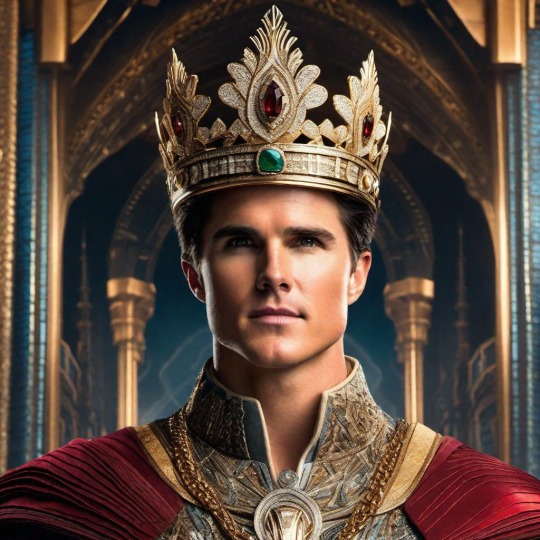
The soldiers searched the room, upending furniture and destroying priceless art. Muddy boots marred the previously pristine marble of the throne room.
The commander strode through the door, his steps heavy. He paused as his eyes scanned the empty room. “Status report!” he bellowed.
“Sir, there’s no one here.”
The rebellion leader shook his head, “Multiple witnesses saw them both enter this room. There must be a hidden chamber or something. Keep searching!”
The new, self-appointed leader of the Cordonian government strolled through the historic hall, taking in the ancient tapestries and formal portraits before stopping in front of one particular gilded frame.
A young Constantine Rys stared sternly out at him, classically handsome in full Cordonian regalia, golden crown gleaming on his dark blond head. His fingers ran across the canvas as he stared into eyes that were identical to his own, “You should have acknowledged me when you had the chance, old man.”
When he had circumnavigated the room, he approached the throne and lowered himself onto it. Lost in thought, he didn’t see his co-leader approaching until a voice pulled him out of his reverie.
“What the hell do you think you’re doing?”
His eyes snapped to the other man’s face, noting the disapproval in his tone, “Sitting.”
“Well, can you find another place to sit? That thing needs to be ripped out and destroyed. It’s a symbol of the oppression we vowed to end.”
The dark-haired young man with ocean-blue eyes and the signature Rys jawline let out a noncommittal, “Hm,” as he regarded his partner.
Anton Severus, the bastard son of the late king had enticed The Liberation Core to join forces with The Sons of the Earth to increase their odds of success against a common enemy, but the Liberation Core was full of idealistic idiots. The common people weren’t fit to rule themselves and Anton had no intention of giving up his newfound power. This was what he had spent his life working toward.
They had used the Liberation Core’s contacts, intel, and technology to stage a successful coup, but the vast majority of the forces currently sweeping through the palace were his. Once the capital was secure, his men would turn on their compatriots. Members of The Core would be given the choice to swear fealty to their new and rightful king. They could join his guard, or they could die. It made no difference to him.
He had offered Constantine a chance to meet his unacknowledged son. A chance to claim him, publicly, to insert him into his rightful place in the line of succession, but the old man had refused, sealing his fate.
Anton’s mother might have been a lowly palace maid, but the royal Rys blood ran through his veins.
Leo’s abdication had spurred him into action. Anton was older than Liam by six months. He was next in line, not that spoiled, coddled brat.
Leo and Liam had been given every advantage that had been denied to him. Even Drake and Savannah Walker, commoners, had been given a royal upbringing, a private education, and full access to the crown’s funds for their every whim while he had languished in the backwoods of Krona.
In response to the announcement of her pregnancy, his mother had been given five years' severance pay plus a bonus for ‘exemplary service’ and sent on her way.
Constantine might have meant for the money to provide for his illegitimate child for quite a few years, but the money and his mother were gone in two leaving his grandmother to raise him.
Anton watched his grandmother struggle to make ends meet. He grew up under the yoke of extreme poverty and felt the sting of deprivation. That is until an elegant and mysterious red-haired woman showed up on their doorstep, taking him under her wing and funding his education.
Anton sat at the best table in the most expensive restaurant in Vallenheim. Across the table was the woman who had funded his entire private education at the elite and prestigious Vallenheim Oaks Preparatory School.
“I’m sorry about your grandmother, Anton.” She was saying.
“Thank you,” he replied stoically, “for everything. Thanks to you her last years were more than comfortable, and she had the best medical care the world has to offer.”
“I’m sure it was some amount of comfort to you both that you got to spend her last days with her.”
“Again, thanks to you. I know I was allowed to take a leave in the middle of the term because you spoke to the headmaster on my behalf.” He fidgeted nervously in his seat, toying with his food.
“What is it, Anton?” she asked sharply. “Say whatever it is that’s on your mind.”
He licked his lips as his eyes met hers then dropped his gaze to his plate, “I…I don’t mean to sound ungrateful but…why? Why have you done so much for us?”
It wasn’t just his education. It was a new house for his grandmother and all of her living expenses. Her medical care at the end and all of the funeral expenses.
Lucretia Nevrakis sat her wine glass on the table in front of her and leaned forward, “Anton, lift your eyes and look at me. It’s time you learned who you really are.”
Instead of responding to his co-conspirator, Anton turned his head as his second-in-command approached, “Claudius, there you are! Status report.”
“No sign of the king, Commander.”
“He’s not the king anymore,” Anton reminded him.
“Of course, sir.”
Ignoring the leader of the Liberation Core who was still glaring daggers at him, Anton asked, “And my traitorous ex-girlfriend?”
The world knew Riley Brooks as the king’s fiancée. She was meant to marry a king alright, but she had chosen the wrong man. He had planned to make her his queen, but that was before she had disobeyed direct orders to rid the world of his younger half-brother and tipped him off about the attack, giving him the time he needed to escape.
“Sorry, sir, nothing yet.”
“Well, when you find her, bring the backstabbing whore to me.”
#the royal romance#trr#trr au#the royal romance fanfic#trr fanfic#choices trr#trr fandom#liam rys#liam x mc#angelasscribbles#choices stories you play#choices
41 notes
·
View notes
Note
Do you think those influencers who dramatically switch from very left wing Marxist alternative etc to very trad Christians (specifically in homophobic/transphobic way) have ketu influence?
You were talking about ketuvians and their struggle to find a sense of self and it made me think of these types of people. I know someone with ketu 1H and magha moon who did this to an extent. She used to identify as non binary and was constantly shifting through different names and pronouns but then one day she just kind of stopped and started saying how she thinks pride is pointless and a waste of time or whatever😭 it wasn’t *that* extreme but I still thought it was a significant shift in belief in such a short time.
I think a lot of people have this dramatic shifts not only out of a need to identify with something due to a lack of sense of self, but also because they like going back to what their parents believe for comfort. I guess those two are interlinked but it’s interesting how my friend is a magha moon and magha is associated with ancestors and whatnot.
I guess mula is somewhat similar as “the root”? Idk about ashwini though
Sorry I haven’t actually had the chance to look into examples since it’s hard to find birth data for influencers and I don’t know that many examples irl 😶🌫️ so this is me just going on a tangent and hoping you get what I’m trying to say LMAO
I’m also not sure if anyone else is familiar with this phenomena or if I’m just too engrossed in niche internet drama.
In terms of influencers I guess a somewhat prominent example is Freckle Zelda on tiktok? I never followed her but she went from making cutesy safe space liberal type content in like 2021 and now she’s a Christian and is using it be to super controversial. But like I said I’ve never followed her so idk if this is dramatic enough of a switch to count as what I’m saying.
I also feel like this a rahu trait to switch between extremes🤔 idk lmk what you think
I feel like the capitalist commodification of identity has most adversely affected Nodal people.
If you think about it, spirituality's aim is to transcend the "self" entirely, you stop identifying with labels and attaching yourself to this or that thing. I'm not saying you cease to be a person but you stop trying to "accumulate" identities to hold on to.
9/10 times the reason we identify with something is to feel a sense of belonging but searching outwards for it will only lead to disappointment, when we search within and feel at home within ourselves, we lose the need to externally confined ourselves to rigid "identities"
Yk how people dye their hair, get piercings/tattoos etc to mark a new chapter or the end of an old one or whatever??? It is an attempt to claim something as "yourself" and "solidify yourself". Everything changes all the time, everybody changes yet there are many people who will never dye their hair or change their name or join a cult or whatever (not that all these things are the same) its just that if you're at peace with yourself and truly grounded, you will no longer be shopping for different identities or things to associate with.
Yk those people who have IG bios that read like "Mother, Pluviophile, ESFJ, Petrolhead, UJC'22, Missourian, Ancient Spirit, 1/4th Cherokee, Bitcoin Enthusiast, EDM Lover"
like what do any of those terms say about them?? how on earth is any of this central to your identity? all of these are external ??? is loving rain and being a petrolhead central to your sense of self?? im not trying to demean anybody's interests, im only trying to point out that what we choose to make the focal point of ourselves is up to us and its possible to not be defined by anything?? i think a truly ugly consequence of capitalism is how people try to define themselves by things outside them (their interests, hobbies, job, income level, marital status etc etc) because there is more to a person than all that.
when we retreat within, we base our sense of self on our qualities like kindness, compassion, creativity (this becomes the essence of who we are) so we don't feel the need to claim 87373 other things to describe ourselves
some people overly identify with others like their partners, friends or even strangers and kind of become them. this is also the root of stan culture, by being obsessed with someone to that extent and giving them all your time and energy, you are losing your own qi and harming your Sun (the same way criticizing the appearance of others ruins your Venus)
Rahu is prone to taking things to extremes and Ketu is prone to trying on different identities and losing interest in all of them one after the other. so your observations are right.
i dont really use social media so i dont know any influencers that i can quote as examples ;-; but im thinking of certain celebrities who have had drastic style changes in the past and all of them have nodal influence lol

in the 2000s, the Olsen twins were known for their boho chic hippie style and over the last decade or so they have become known for their "quiet luxury" style. They are Magha Moon
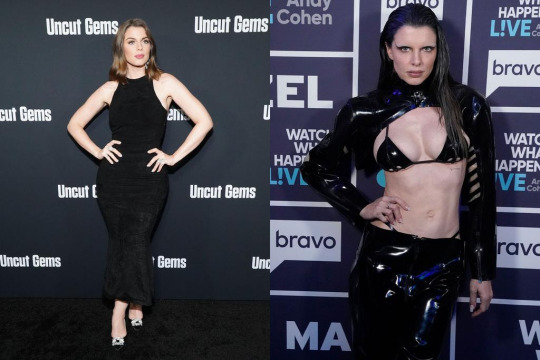
Julia Fox is Ardra Rising and she went from basic to avant garde
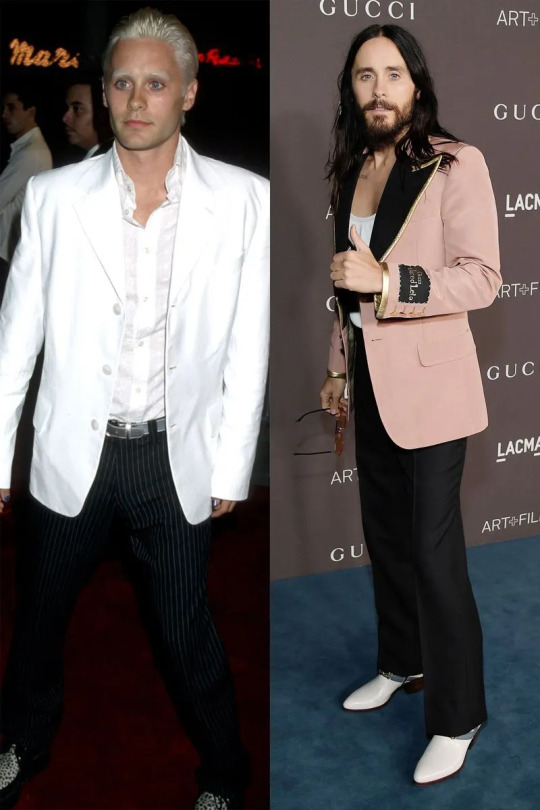
Jared Leto, Mula Sun, Ashwini Moon & Rising , he's also the leader of a cult allegedly so👀i guess it all adds up

Adele, Mula Moon & Ardra Rising
im not just talking about her weight loss, just her overall change in style. she got married young and had a baby and in a couple of years she got a divorce and revamped her look to that of an ig baddie
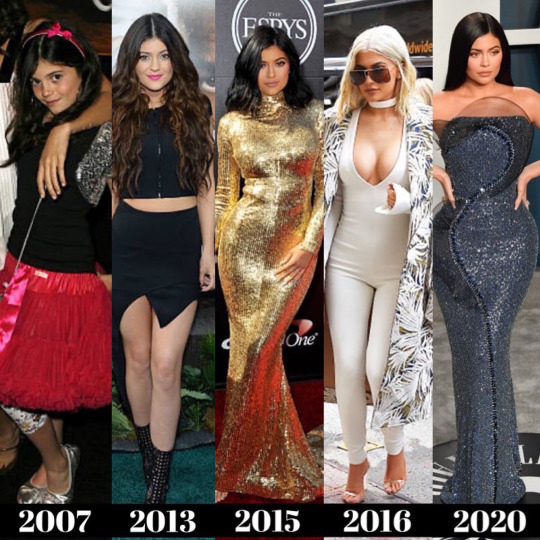
Kylie Jenner, Swati Moon she's changed her style/demeanour every other year since the early 2010s lol
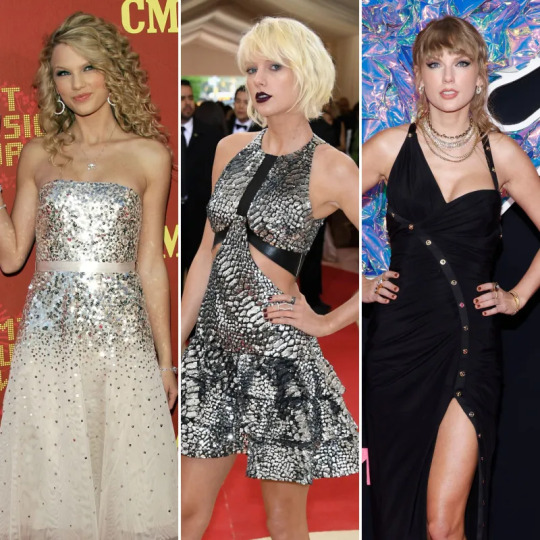
Taylor Swift, Ardra Moon has also had many diff lewkzz throughout the years
before anybody says dont celebs change their styles often?? no they dont, not everybody for sure. look at Jennifer Lopez or Sarah Jessica Parker, theyve been dressing the same since the 90s. constantly evolving style/looks/personality is a Nodal thing. its also a big part of the reason why Nodal people succeed in the entertainment industry and in the material realm (a lot of rich people including Bezos have Nodal placements) because entertainment = illusion, pretending to be someone you're not and for Nodal people, this is pretty much second nature.
im sorry that my response is kind of all over the place. your question provoked some thoughts within me lol and i just had to shareee
i cant think of celebs who have drastically changed their life paths like the example u cited ;-; EXCEPT Bridget Mendler who is an actor, singer, and entrepreneur, has a PhD and went to Harvard Law and now runs a satellite company?? she also adopted a kid during all this? She has Mula Sun
anywayyys thats it for now
tysm for sending this ask!!! its a very thought provoking and interesting question<33hope u have a good day<33
32 notes
·
View notes
Note
anyone else struggling to come to terms with their identity ? i know im fictoromantic (and i dont feel romantic attraction to other real people) but im scared its cringe or weird so i pretend im not most of the time
im sure i cant be the only one right 😭 ?
You're definitely not the only one. A lot of aro spectrum people struggle with accepting their identity, and I think microlabels especially tend to get targeted by less accepting people and bad faith actors.
My first big of advice is if you do see people going after microlabels, block liberally and use filters where applicable to avoid seeing those posts. The opinions of people who target other people's identity are not ones that matter and you'll be missing out on nothing by hiding them.
Second, seek out fictoromantic positivity. Do a tumblr search, check tags, and reblog or save your favourites somewhere you can go back and regularly look at them. Follow ficto people and people who post supportive things about ficto people.
Your identity is not cringe, microlabels like fictoromantic give people words for experiences they were already having and helps them find other people with similar experiences. You probably already know this logically, but it can be hard to learn it emotionally. Writing out positive things about the fictoromantic label or being fictoromantic, or saying it to yourself while looking in a mirror can help bridge that gap.
If you want to use more general labels (either with some people or everyone) to avoid being mocked that is allowed, it's always up to you to decide how much of your identity you want to share, and with who. If you don't trust people to be respectful, you don't have to share your identity, or your full identity. Though of course if you want to be loud and proud, that's good too, but be aware you have a choice in the matter and you're allowed to do what feels right to you.
All the best, Anon! Good luck!
21 notes
·
View notes
Text
The Christianization of African-Americans
Postcolonial American culture's preoccupation with breaking away from Europe was far removed from the situation among Africans in the United States at the time. The initial tenacity with which African Americans held onto their indigenous practices and the reluctance of many Southern white slaveholders to teach Christianity to the slaves limited the Christianizing process in the early period. Even the Great Awakening of the 1740s, which swept the country like a hurricane, failed to reach the masses of slaves. Only with the Great Western Revival at the turn of the nineteenth century did the Christianizing process gain a significant foothold among black people.
The central questions at this junction are: Why did large numbers of American black people become Christians? What features of Protestant Christianity persuaded them to become Christian?
The Baptist separatists and the Methodists, religious dissenters in American religious culture, gained the attention of the majority of slaves in the Christianizing process. The evangelical outlook of these denominations stressed individual experience, equality before God, and institutional autonomy. Baptism by immersion, practiced by Baptists, may indeed have reminded slaves from Nigeria and Dahomey of African river cults, but fails to fully explain the success of the Christianizing process among Africans.
Black people became Christians for intellectual, existential, and political reasons. Christianity is, as Friedrich Nietzsche has taught us and liberation theologians remind us, a religion especially fitted to the oppressed. It looks at the world from the perspective of those below. The African slaves' search for identity could find historical purpose in the exodus of Israel out of slavery and personal meaning in the bold identification of Jesus Christ with the lowly and downtrodden. Christianity also is first and foremost a theodicy, a triumphant account of good over evil. The intellectual life of the African slaves in the United States —like that of all oppressed peoples— consisted primarily of reckoning with the dominant form of evil in their lives. The Christian emphasis on against-the-evidence hope for triumph over evil struck deep among many of them.
The existential appeal of Christianity to black people was the stress of Protestant evangelicalism on individual experience, and especially the conversion experience. The "holy dance" of Protestant evangelical conversion experience closely resembled the "ring shout" of West African novitiate rites: both are religious forms of ecstatic bodily behavior in which everyday time is infused with meaning and value through unrestrained rejoicing.
The conversion experience played a central role in the Christianizing process. It not only created deep bonds of fellowship and a reference point for self-assurance during times of doubt and distress; it also democratized and equalized the status of all before God. The conversion experience initiated a profoundly personal relationship with God, which gave slaves a special self-identity and self-esteem in stark contrast with the roles imposed upon them by American society.
The primary political appeal of the Methodists and especially of the Baptists for black people was their church polity and organizational form, free from hierarchical control, open and easy access to leadership roles, and relatively loose, uncomplicated requirements for membership. The adoption of the Baptist polity by a majority of Christian slave marked a turning point in the Afro-American experience [...] Independent control over their churches promoted the proliferation of African styles and manners within the black Christian tradition and liturgy. It also produced community-minded political leaders, polished orators, and activist journalists and scholars. In fact, the unique variant of American life that we call Afro-American culture germinated in the bosom of this Afro-Christianity, in the Afro-Christian church congregations.
- Cornel West ("Race and Modernity," from his Reader, pages 61-63, 63)
29 notes
·
View notes